#not even just 'it exists' but like some of the worst examples of the subject that can be put into the fantastical setting.
Explore tagged Tumblr posts
Text
listen. people can do whatever they want with their muse and their interpretation of canon. but god something rubs me wrong about people introducing misogyny/disparity in a setting where canon pretty firmly says ‘this is a non-issue due to the structure of this fantasy world/society in no way reflecting our own real world.’
and no i’m not talking about da trying to be egalitarian and falling short so fandom calls out the failure in worldbuilding, i mean canon definitively introducing women as warriors, leaders, rulers, villains, and monsters, all while no one in universe bats an eyelash or is weird about it.... but surely there must be an insidious undertow and women have to be told to stay in the kitchen or passed over for power or something else that clearly does not exist outside of fanon.
#it feels weird and inorganic. why does misogyny have to exist when i just want a lady warrior that swings sword and no one gives a shit.#the developers clearly did not give one so why do others make it so weird.#not even just 'it exists' but like some of the worst examples of the subject that can be put into the fantastical setting.#womens empowerment does not have to come at the expense of womens struggles against The Man.
5 notes
·
View notes
Text
I am posting and responding to this ask anonymously as I don't want anyone harassing its sender. This has already been communicated with the person who sent the ask.
I just want to thank you for being a light in the darkness of anti-semitism, especially on this website. I have found I am on this site a lot less ever since it was made clear that other leftists here are more anti-semitic than we ever knew possible, using very specific wording of our own trauma against us (i.e. saying stuff like "colonialism", "genocide/ethnic cleansing", and calling JEWISH PEOPLE Nazis). It feels like, at best, they know Hamas ≠ All or even most Palestinians, but think that they think all JEWS = Bibi; and at worst, agree with Hamas and think of him as some sort of "freedom fighter". So, thank you from one leftist Jew to another, just trying to keep afloat here. ❤️
You are very welcome; it's certainly been overwhelming, and I'm glad this can be a safe space for you.
I do want to push back on some of this ask, though. Specifically in regard to terms such as "colonialism," "apartheid," "genocide," and "ethnic cleansing."
The use of these terms is not inherently anti-Semitic. For a lot of people, these terms are the best ones they have access to describe what they are seeing. I do think such terms as “colonialism” and “apartheid” are overly simple in regard to the last ~3000 years of Jewish history, and that they cast the situation into an alien historical context which dilutes and uncomplicates the all the historical realities at stake, but I truly do not think that all who use these terms do so to cause Jewish people pain.
Further complicating the picture is that terms like "colonialism" aren’t completely wrong. Modern Zionism arose in the context of mid-nineteenth century European large-scale movements towards nationalism (ie, the creation of nation-states) and away from the multi-national empire. Jews—a subject of anti-Semitism and fifth columnist suspicions within those emergent European nations—reacted to all this by joining the nationalism game.
What’s ironic, is that those European Jews who founded contemporary Zionism were reacting to the exclusion and racial hatred with which Gentile Europeans treated them, and then once they had some settlements in Palestine, they deployed similar variants of racial hatred at both the Palestinian Arab population, and Middle Eastern Jewry.
The existence of a distinct people and ethnic group in Palestine before the aliyot were not something the first generation of Zionists were concerned with. Because they were part of the same shitty, white supremacist, pro-imperialistic intellectual European tradition to which they were responding as victimized parties. As time went on and Zionist thought spread across Ashkenazic communities, we can see some variants. Some forms of far-left Zionism in twentieth century Poland, for example, actively built the presence and rights of Palestinian Arabs into their ideology, some of them actively stating that Zionism could not be a success if it necessitated transforming Palestinian Arabs into a group of secondhand citizens and a cheap source of labor in their own home.
Those leftist strands of Zionism tended to be Socialist/Communist in nature, and centered around the idea of life in Eretz Yisrael as one of a series of self-sufficient communes. Thus when the 1930s hit and things start to go bad, the Zionists we see fleeing to Palestine tended to be of the more centrist and far right variants. The left wing, socialist movements, already operating as a collective, had a membership uncomfortable with fleeing to safety while the rest remained behind.
And that same socialist/communal attitude, is why those variants of Zionist thought never made it into the Israeli political mainstream; most of their members and proponents were murdered in the Holocaust in part because they refused to leave their comrades behind. The General Zionists and Zionist Revisionists who rode out the years of the Holocaust in Palestine therefore already had access to the avenues of power which would become important in 1948, when the British Empire shrugged off its responsibilities towards the regions it colonized and destabilized.
Now, as for ethnic cleansing. I can’t sugar-coat this: that’s what the Naqba was. It was ethnic cleansing of Palestinian Arabs from their homes to make way for the Jewish State. The manipulative shit (but still somehow extremely prestigious) youth group I was in taught us that Arabs call it Naqba because they hate Jews and therefore existence of Jews in the Southern Levant was a tragedy, as was the fact that Hitler didn't finish the job.
That’s garbage: it’s called the Naqba because it was ethnic cleansing. And that's not the fault of the Holocaust survivors who made their way to Mandatory Palestine/Israel in the late 1940s--they lacked political power, and were often looked down upon by those who did; the Holocaust as part of Israeli National Mythology wasn't an immediate Thing.
If you spent your formative years around older Jewish folks of A Certain Generation, whose trauma has pretty much placed a permanent block on their ability to see some of what went down in 1948 for what it was, I can’t blame you for having that gut/cognitive dissonance reaction to the use of “ethnic cleansing” in the context of Israel and Palestine. I know those older folks. I loved them. They’re mostly gone now, and I miss them terribly. But their trauma-induced view of everything lives on in the ability of some younger Jews to properly name and understand what it is that happened in 1948.
It was ethnic cleansing.
Further, not only were Palestinian Arabs ethnically cleansed, but the Middle Eastern and North African (MENA) Jews who were forced by their governments to flee their homes of thousands of years and seek refuge in Israel throughout the second half of the twentieth century…the Western and Central European Jews in control of Israel and its institutions treated them like shit too. Hadassah actively stole the babies of Yemeni Jews, told the parents that their children were dead, and rehomed them to Ashkenazic couples. There were death certificates. Members of the Ethiopian Jewish community were forcibly sterilized, and their ongoing treatment by the State is racist and generally atrocious. And this analysis of the relationship between the Israel State, MENA Jewish populations, and different Ashkenazic groups in Israel is horribly short and overly simple.
As for genocide. I honestly don’t know. I do know many people, who are very much not Anti-Semites, who are calling what’s happening in Gaza right now genocide; many of these people are also Jewish. I know many others who refer to the experiences of Palestinians between 1948 and now as a slow genocide. Many of these people are also actively not anti-Semites, and many of them are Jewish.
So these terms, as uncomfortable as they may feel for people within the very specific Jewish generational background I believe we share, are not deployed as anti-Semitic weapons. Nazi comparisons? Yes. Swastikas superimposed over the Star of David? Yes. Very specific hook-nosed Jewish caricatures in relation to Israelis? Yes. Blood libel shit? Yes. These are all anti-Semitic, and are deployed to hurt and retraumatize Jewish people. But the rest are not nearly that simple.
And I didn’t learn this from like, Bad Evil Post-Modern Academics at Columbia University Who Hate Jews; I learned this from doing graduate-level work in the field of Modern Jewish History, and working in Jewish archives; this did not come from outside the building.
Now, as for Hamas as freedom fighters…that’s ignorant at best. Hamas’ charter clearly calls for the global destruction of the Jewish people [ETA: they edited this part out in 2017 for PR purposes], and their actions as rulers are horrifically, violently, homophobic, and seem to be more abut provoking Israel than they are about governing and protecting their people. But as you said, Hamas isn’t all Palestinians, and it’s also not all Palestinians who consider themselves freedom fighters. (A second reader of mine had the following commentary on this paragraph: "Might need a bit more complication around Hamas? I know that's not your area of expertise but it's worth mentioning that they were basically set up to undermine the PLO and what would become the Palestinian Authority in the West Bank. You're right that they aren't representative of all Palestinian thought and resistance, and that they are on some fuck shit.")
So while I’m so glad that blog is a comfort to you, I encourage you to also take a step into some of your discomfort, and ask yourself where it comes from.
No one reading this post has my consent to use it to silence other Jewish people who are in different stages of their journey towards understanding how generational trauma has impacted their ability to grasp all of this. Further, if you choose to attack me for gently calling my people in, you're a piece of shit and I will be mean to you.
913 notes
·
View notes
Text
You thought I forgot? @naravelia
The Tamlin Mandela Effect: How Fandom’s Misremembering of Key Events is Turning into a Haters’ Anthem
There’s a peculiar phenomenon in the A Court of Thorns and Roses (ACOTAR) fandom that echoes something you might find more commonly in conspiracy theories or internet forums. It’s the Mandela Effect, named after an odd cognitive twist where people collectively misremember or distort facts—like a whole generation swearing that Nelson Mandela died in the 1980s, despite him actually living until 2013. But we’re not here to talk about Mandela (no, this is not that essay). We’re here to talk about how Tamlin, our misunderstood High Lord of the Spring Court, has been subjected to this exact effect. And it’s spiraling into disastrous consequences for his reputation in the fandom.
If you’ve spent more than five minutes on any ACOTAR discussion board, you’ve probably seen it. Tamlin haters, pitchforks in hand, rattle off the same tired arguments, claiming that he’s the worst villain in the series. “He sold Feyre’s sisters to Hybern!” they say, even though that literally didn’t happen. “He sexually assaulted Feyre Under the Mountain!” they continue, though that scene plays out very differently if you actually read it. It’s becoming a Herculean task to correct these misconceptions every single time someone drags Tamlin through the mud, but here we are, doing the Lord’s work.
Let’s dig into the mess, piece by piece, shall we?
The Non-Existent Sale of Feyre’s Sisters to Hybern: The Misinformation Continues
Here’s a hill people are dying on that is as fictitious as it is frustrating. There is this collective belief that Tamlin, in all his "evilness," sold Feyre’s sisters to Hybern in some dramatic betrayal. Let’s be real: if Tamlin were a sleazy car salesman in another life, he wouldn’t have any buyers. Because he didn’t “sell” anyone.
Let’s revisit the facts. Tamlin teamed up with Hybern in A Court of Mist and Fury out of desperation to get Feyre back. Was it the smartest move? No. Did he expect things to go smoothly without Hybern’s penchant for destruction taking the reins? Probably. But nowhere in the text does it indicate that Tamlin knowingly offered up Feyre’s sisters on a silver platter.
In fact, Tamlin seemed to have absolutely no idea that Elain and Nesta would be dragged into the mess. The King of Hybern double-crossed everyone, Tamlin included. Feyre’s sisters being thrown into the Cauldron was Hybern’s decision—not some malicious masterstroke from Tamlin’s end. This narrative where Tamlin is painted as the orchestrator of their suffering is wildly inaccurate. It’s like saying a passenger in a car crash is guilty of the accident. Was he complicit by being in the metaphorical car with Hybern? Sure. But did he plan for it to happen? Absolutely not.
And yet, despite this being pretty clear in the text, people still treat it as canon that Tamlin personally wrapped Feyre’s sisters up in pretty bows and delivered them to Hybern like Christmas gifts. The Mandela Effect strikes again.
The “Tamlin Assaulted Feyre Under the Mountain” Lie That Refuses to Die
This one is probably the most egregious example of people twisting canon to fit their own narrative. Now, look, I get it—Under the Mountain was a dark time for everyone. Emotions were high, trauma was rampant, and it was one hell of a mess. But this claim that Tamlin sexually assaulted Feyre during her time there? That’s not just a stretch—it’s an Olympic-level leap of inaccuracy.
Here’s what actually happened: Amarantha had Tamlin under her thumb. He was powerless, trying to bide his time and keep himself (and others) alive. Was he the best emotional support system for Feyre during this period? Absolutely not. Did he make questionable decisions? Yes. But at no point did Tamlin assault Feyre or take advantage of her.
The argument stems from a scene where Feyre, reeling from her third trial, is given a brief moment of respite with Tamlin. They have a charged, emotionally heightened interaction. It’s not comfortable, but it’s also not what people are accusing it of being. Tamlin is desperate, Feyre is desperate, and they’re both stuck in a situation with absolutely no control. If anything, it’s a moment that reflects the trauma of being trapped Under the Mountain—not a moment of assault. The fact that this narrative continues to be twisted into something more sinister is a disservice to both characters and to the complexity of trauma and survival.
Moreover, Feyre doesn’t feel violated by Tamlin in this moment. She doesn’t reflect on it later as assault. If Feyre, who narrates the entire series, doesn’t see it as such, why are we putting words in her mouth? The Mandela Effect here is just baffling—people are conflating Tamlin’s flaws with things that never actually happened. It’s like misremembering the plot of Titanic and insisting that Jack could have survived if only he’d kicked Rose off the door sooner. Except, you know, worse.
The Constant Gaslighting Narrative: Feyre’s Love for Rhysand Suddenly Erased All Else?
Perhaps the most absurd consequence of the Tamlin hate train is this retroactive gaslighting of Feyre’s own character. By the time we get to A Court of Frost and Starlight, Feyre casually drops that she’s loved Rhysand since Under the Mountain. Excuse me, what? Let’s go back to the text, shall we?
In ACOTAR, Feyre is doing everything in her power to save Tamlin—not Rhysand. In fact, Feyre hates Rhysand for most of that book (and rightly so). She is willing to sacrifice herself for Tamlin, to endure Amarantha’s torment because of the deep love she feels for him. The entire climax of the book hinges on Feyre’s determination to free Tamlin, not Rhysand.
But suddenly, we’re supposed to believe that she’s been in love with Rhysand this whole time? Yeah, no. That’s like claiming you’ve loved pizza your entire life but spent your formative years swearing you couldn’t stand the taste of cheese. It doesn’t add up. The revisionism here is frustrating because it attempts to erase Feyre’s complex feelings for Tamlin, reducing them to some passing crush while elevating her relationship with Rhysand to an almost predestined love story. It’s not only inaccurate; it’s unfair to the nuance of Feyre’s journey.
And for those who claim that Tamlin was manipulating Feyre from the start: let’s not pretend Rhysand wasn’t manipulative as well. Rhysand, for all his brooding High Lord charm, was hardly honest with Feyre at first. He didn’t tell her about the mate bond until after she’d fled the Spring Court, allowing her to suffer through an emotional tailspin in the meantime. If we’re going to talk about manipulation, let’s talk about it on both sides of the equation.
Tamlin’s Villain Arc: When Did Fandom Decide He’s the Devil Incarnate?
Let’s get one thing clear: Tamlin is not perfect. He has anger issues, control issues, and makes some boneheaded decisions. But turning him into the ultimate villain of the series is not just a misstep—it’s a full-blown mischaracterization.
Tamlin’s actions in A Court of Mist and Fury—his attempts to lock Feyre in the Spring Court, his alliance with Hybern—are not the actions of a villain, but of someone who is deeply flawed and unable to cope with the trauma he’s experienced. He is desperate to hold on to the one thing he thinks he can still control: Feyre. Is it right? Absolutely not. Is it a classic case of toxic masculinity and overprotection? Yes. But that doesn’t make him an evil character—it makes him a tragic one.
The fandom has somehow turned Tamlin into a one-dimensional antagonist, ignoring the deep trauma he’s endured and the complicated reasons behind his actions. People seem to forget that Tamlin genuinely cared for Feyre—enough to let her go at the end of ACOTAR. That’s not something a villain would do. Villains don’t sacrifice their happiness for the well-being of others, but Tamlin did. He wanted Feyre to be happy, even if it wasn’t with him.
But thanks to the Mandela Effect of the fandom, Tamlin’s complexity has been erased, replaced with a caricature of a monster. Every time someone falsely claims that Tamlin sold Feyre’s sisters, or assaulted her, or that he’s some irredeemable villain, it becomes harder and harder to pull the conversation back to reality. The narrative has been hijacked by misinformation and misremembering, and the truth is becoming increasingly difficult to find.
The Lord’s Work: Fighting Misinformation One Comment at a Time
At this point, defending Tamlin’s character feels like doing the Lord’s work. The sheer volume of misinformation being spread about him is staggering. And every time someone presents an accurate, well-reasoned argument about what really happened in the series, they’re met with a wall of denial from those who have bought into the Mandela Effect narrative.
It’s exhausting, and yet it’s necessary. Because if we don't keep correcting these misconceptions, the narrative only gets more distorted. The truth gets buried under layers of fan-driven exaggeration, selective memory, and willful ignorance. It’s as if every time someone tries to present a factual argument, they're drowned out by a chorus of “But Tamlin sold Feyre’s sisters!” or “He assaulted her!”—as though saying it louder makes it more true.
Yet, here we are, repeating ourselves like broken records, diligently doing the work to remind people of the actual storyline. Is it thankless? Sure. Is it worth it? Absolutely. Because when the truth is at stake, when a character as complex and tragic as Tamlin is being reduced to an easy-to-hate villain, it’s our responsibility to keep the conversation grounded in fact.
Why Do People Cling to These Misconceptions?
Here’s where it gets a bit more philosophical. Why, despite the evidence in the text, do so many fans persist in demonizing Tamlin and clinging to false narratives? The answer, I think, lies in the very nature of fandoms themselves.
Fandoms are not just about the source material—they’re about how people feel about the source material. And feelings, as we all know, are not bound by logic or facts. For many readers, Tamlin represents a particular archetype of toxic masculinity—one that they’re all too familiar with in the real world. When they see Tamlin’s controlling behavior, his anger, and his mistakes, it triggers a visceral reaction. He becomes, in their minds, the embodiment of every harmful, controlling man they’ve encountered or heard about.
Rhysand, by contrast, is portrayed as the perfect “feminist” male hero—someone who respects Feyre’s autonomy, who lifts her up instead of controlling her. It’s easy to see why readers gravitate toward Rhysand and against Tamlin, even when the actual story is far more nuanced.
The problem, of course, is that Tamlin isn’t just an archetype. He’s a fully fleshed-out character with his own trauma, motivations, and flaws. But once a fandom has decided that a character is “bad,” it’s incredibly hard to change that perception, even with cold, hard facts.
The Real Tragedy: A Missed Opportunity for Redemption
What makes this whole Mandela Effect situation even more tragic is that it closes the door on one of the most interesting possibilities in the ACOTAR series: Tamlin’s redemption.
Tamlin is a character who has made mistakes, yes—but so has every major character in the series. Feyre herself is no saint; Rhysand’s hands aren’t exactly clean either. Yet these characters are given the chance to grow, to learn from their mistakes, and to become better versions of themselves. Tamlin, on the other hand, is left to wallow in his misery, largely abandoned by both the narrative and the fandom.
Imagine if the fandom allowed Tamlin the same grace they allow other characters. Imagine if, instead of reducing him to a one-note villain, they embraced the possibility of redemption. Tamlin’s arc could be one of the most powerful in the series—a story about a broken man learning to rebuild himself, about a leader who learns to lead with compassion instead of fear. But as long as the Mandela Effect continues to distort his actions and his character, that possibility remains out of reach.
Conclusion: The Battle Continues
In the end, fighting the Mandela Effect surrounding Tamlin is an uphill battle. It’s frustrating, it’s repetitive, and at times it feels hopeless. But it’s also necessary. Because Tamlin, for all his flaws, deserves better than the treatment he’s received from large swaths of the fandom.
He didn’t sell Feyre’s sisters. He didn’t assault her Under the Mountain. He’s not the devil incarnate. He’s a deeply flawed, deeply human (or, well, fae) character who made mistakes but also showed moments of love, sacrifice, and growth.
So here we are, doing the Lord’s work, repeating the same truths over and over again, hoping that someday the message will finally stick. Because Tamlin’s story is not one of villainy—it’s one of tragedy. And it’s time the fandom started treating it that way.
#anti acotar#pro tamlin#anti rhysand#anti rhys#anti feyre#anti morrigan#anti ic#pro nesta#tamlin#anti mor#acotar#anti feysand#anti inner circle
168 notes
·
View notes
Text
i find it so desperately sad that goyim generally would be so much less antisemitic if jews started physically fighting back with guns or sticks in every country. calling for the murder of muslims all over the world, if the jewish population was big enough to have large scary groups of crazy fringe fundamentalist synagogues all over the world, a billion strong, that preached murder and hate so goyim could look down on jews like some noble savage in need of assistance and western education and protection. so we could be reformed in obvious patronizing ways because there were so many of us that we had militant violent fringe extremists, like christians and muslims have, mixed in with the normal jews.
if jews didn't have such a reputation for success and intelligence maybe conspiracy theories would stop blaming us for controlling the world. if we felt less in danger maybe we wouldn't be so obsessed with long term survival.
is antisemitism some warped form of envy? maybe. what sucks is that jews are no better or worse than anyone else. some jews are brutes and some are the most wonderful people imaginable, just like any other group. what sucks is we don't all live up to the reputation of tactical geniuses and wizards with mind control magic. all of us jews are just tired and abused humans who have lived with 2000+ years of generational trauma and the endless fall out from a popular jewish book written 3000+ years ago describing the best practices of jewish culture. It has some great stories, histories, life advice, diet recommendations, hygiene, and rules about how to treat others.
is that such a crime?
trying to show a path forward? not demanding anyone else follow those rules but wanting to do our best to follow them anyway? how to live a good life that makes the world better and makes you proud to have been on earth for the time you were there? jews fail to do this all the time, just like everyone else. I fail all the time. why are people so obsessed with that? people say shylock is a stereotyped antisemitic character but,
"I am a Jew. Hath not a Jew eyes? Hath not a Jew hands, organs, dimensions, senses, affections, passions? Fed with the same food, hurt with the same weapons, subject to the same diseases, healed by the same means, warmed and cooled by the same winter and summer as a Christian is? If you prick us, do we not bleed? If you tickle us, do we not laugh? If you poison us, do we not die? And if you wrong us, shall we not revenge? If we are like you in the rest, we will resemble you in that. If a Jew wrong a Christian, what is his humility? Revenge. If a Christian wrong a Jew, what should his sufferance be by Christian example? Why, revenge! The villainy you teach me I will execute, and it shall go hard but I will better the instruction."
so why do jews always have to be the better man? why do we have to apologize for being angry and sad and hating the people that attack us? that was written by Shakespeare, a christian in the 1600s who who had probably never met a jew, they were expelled from england, but imagined us as money lenders, the only profession left to jews at that time. even he saw the double standard. it makes a good point.
now, i don't want vengeance, i don't want violence, but i feel vengeful. i feel angry that i am unsafe because of play actors and terrorist supporters who want revenge for jews existing but scream bloody murder when jews refuse to dig their own graves, beg forgiveness for ever being born, and lay down in them to be mocked and pissed on and abused in the worst ways imaginable for the entertainment and conquest of it. i want peace with them. they are as human as i am, full of foibles and anger. i want nothing to do with them. i want them to never come near a jew again for the rest of time.
i am sad. all i want is to feel my feelings and advocate for what is the most ethical and practical work around to a world filled with unending suffering while i am still alive. i want them on thier side to live in the world they want and me on my side to live in the world i want. why don't these children of all ages, lost in delusions of fantastical battles and ultimate good and evil, see that? why can't I be a human first as well as a jew first? why do they ask me to pick? why am i not allowed to pick?
it's been almost a year. we're all so tired.
I'm going to a music festival. I'm trying to decide whether to wear a star. why is it dangerous to wear a star around my neck?
#jumblr#antisemitism#ramble#jewish#jewblr#the sadness hit me like a gust of wind before a storm#i wanted to say something before it hits#whenever it hits#judaism#jewish history#a moment of grief#I'm trying my best
148 notes
·
View notes
Note
you mentioned many times that wizards don't study magical theory at Hogwarts, but they have a book on the list for first year! and in book 7 there is an ad on a bookstore about it. maybe they don't study it as a separate subject, but they are told about the theory at every single one. the same laws on Potions or Transfiguration are theories in sum. the academic program at Hogwarts is just terrible, fact.
I also think that most wizards don't think about theory as such, that's why we have what we have. they are more interested in politics, careers, teatalks or money than magical theory or slavery or feminism or other cool things. they're used to their lives, they're used to magic, and I can also assume that muggleborns adopt this behavior, or, more appropriately, don't think about the nature of magic either - it's there, and that's enough. people are extremely lazy by nature to seek knowledge.
and let's be honest - not all wizards as talented as Snape - most are still ordinary and do not have outstanding skills to think about something else. most people are like that, wizards are not much different in this.
however, the theory that the Ministry is an authoritarian structure and silences everything is possible fact and does not contradict the above. yk corruption and biggotry. and I am sure that it is easier for purebreds to apply for licensing (if it exists at all) of their work, of any nature
Like, they study very select parts of magical theory, I'd say. Like, they learn about Gamp's laws of transfiguration, they learn the Unforgivables require you to "mean them" but they aren't told what it means. They aren't told why any of what they learn is true, so I won't really call it as "studying magical theory". At least not properly.
Becouse even the bits of magical theory they do study is... well, it's flimsy and inaccurate at best and outright false at worst.
The official definitions of what is Dark Magic make zero sense:
Dark Arts referred to any magic that was mainly used to control, harm or kill its target.
I mean, Amoretentia and Obliviation are both mainly used to control someone, and they aren't considered dark. Why? You can kill a troll with Wingardium Leviosa (as proven in first year) and yet the killing curse is what's illegal and not the act of killing regardless of what spell you use. Diffindo is literally called "the Severing Charm" it's used only to harm the target (the target just doesn't have to be a person) and it's not dark magic. Many hexes and jinxes are considered dark, yet they are legal because they supposedly aren't as "corruptive" as other dark magic? Even though except Voldemort we don't see any dark wizard corrupted by dark magic and even Voldemort's supposed dark magic corruption is questionable.
What I'm saying is their terminology sucks. Even the difference between charms, jinxes, hexes, curses, and transfiguration isn't always clear-cut (quite often it isn't, actually) and there are many misclassified spells.
Like, the Tongue-Tying Curse is referred to as a curse even if it's clearly not as severe as most curses are and should probably be classified as a jinx or a hex. The Hardening Charm (Duro) is called a charm and it is referenced in a charms book although it's more akin to a transfiguration spell than a charm (hence why the mobile game Hogwarts Mystery placed it in transfiguration, an understandable mistake). The Anti-Alohamora spell is classified as a charm but for some reason, the Anti-Disapparation spell is classified as a jinx. None of this makes sense.
Basically, a lot of magical definitions are very arbitrary and have everything to do with ministry regulation and nothing to do with actual magical theory and how these spells work. The book by Slinkhard Umbridge assigns is an extreme example of this:
“He says that counterjinxes are improperly named,” said Hermione promptly. “He says ‘counterjinx’ is just a name people give their jinxes when they want to make them sound more acceptable.”
(OotP)
The book literally groups a bunch of spells that aren't dark magic as jinxes, and therefore, they are considered dark magic according to Slinkhard. Which fits what the ministry is trying to do. They are trying to make the population defenseless, to make sure Dumbledore doesn't have a student army (which is what Fudge fears). So they discourage casting counterjinxes (and other defensive magic) by redefining them as "dark". Like, Umbridge's whole shtick is to make sure they don't learn Defence Against the Dark Arts.
The above is an extreme example but all their school books have biases and inaccuracies. I mean, we also know Advanced Potion-Making that Slughorn assigned had many inaccurate recipes and that Snape altered almost all of that book to make it correct (even on the theory aspects). And it was used for teaching at Hogwarts for years! And no one had an issue with that!
Like, I just know the Magical Theory book they had in first year doesn't really explain why spells need to be said a certain way or why a wand needs to be waved one way or another. Like, the magical theory they know is very limited and shallow. They know the rules of how spells and potions work on the surface, but they don't know why it works this way. They have no clue how magic actually works. (If Hogwarts was teaching it, they'd be learning Latin which most of their spells are based on in the UK).
That's why I blame the ministry and Hogwarts curriculum for hiding information. It's not just that they aren't teaching magical theory, they are teaching factually incorrect magical theory and misclassifying spells constantly.
And sure, the wizarding population in general is academically lazy, but a government and education system affect how "lazy" a population is and a good education system can improve the general understanding of people and their critical thinking. People aren't as naturally lazy as you think, the systems in the wizarding world encourage them to memorize instead of think and to be lazy. There are cultures that are more academically inclined than others due to cultural and systematic factors. How lazy their society is is an issue with their system.
Not to mention the fact the only government-approved path to academically study magic is to become unspeakable. The whole point of Unspeakables is that they are unspeakable — don't talk about what they study — and yet they are the only ones studying the nature of magic and magical theory. It is clearly hidden from the public if the people studying it are sworn to secrecy. I mean, they wouldn't be sworn to secrecy if there wasn't something shady and corrupt going on, after all, it's not a matter of security like in the DMLE, it's a matter of science. You'll only silence the scientists when you don't want the people to know how the world works for some reason or another.
What I'm saying, is that everything in how their world operates suggests an authoritarian, controlling government that maliciously manipulates their culture's understanding of magic. And, well, there's a reason Fudge sent Umbridge in at year 5 — the year in which he fears he'd lose his control over the population. Because a misinformed & defenseless society is easier to control.
As an aside, since you asked about it, there is a registration process for spells you make up to be approved for use:
“Why does it matter if it’s handwritten?” said Harry, preferring not to answer the rest of the question. “Because it’s probably not Ministry of Magic- approved,” said Hermione.
(HBP - when talking about spells in the HBP book)
#harry potter#hp#hp meta#hollowedtheory#asks#anonymous#harry potter meta#wizarding world#hp magical theory#wizarding society#hollowedrambling
48 notes
·
View notes
Text
mha is suchhhh an unserious anime yeah welcome to my hero academia u get a fun little magic power that without fail will have SOME silly factor to it and u get to go to the magic power school with a bunch of genuinely lovable teenagers and together through the hashtag power of friendship u help each other succeed and u all just want to be amazing heroes and be good and who wouldn't want that and the headmaster is literally some sort of rodent thing and ur homeroom teacher regularly naps on the clock you get taught english by Presentation Michael it's all so so so unserious and silly and the Good Magic Power School is kinda leaning into authoritarianism and the government body that oversees the magic power heroics is explicitely corrupt in fact one of the coolest most impressive heroes of your generation got child trafficked into his career and subject to incredibly rigorous training as well as a highly policed lifestyle that ultimately led to him stabbing a man on national television just bc the government told him to but he's really cool dont worry about if he got a trial or not he can fly really really fast and anyway he's second to a known child abuser it's all so confusing thank GOD there's such a strict, enforced distinction between 'good' and 'bad' to the point even the magic powers u biologically have no choice over and are given before the age of 4 hold moral value and determine ur success in society and if that didnt clarify things enough u also have villains to personify these bad morals for example the son of aforementioned child abuser who was manipulated and trained since birth to have his sole purpose in life surround his success at heroics and when he was unsuccessful he got thrown away and replaced by his little brother who also got abused by their super heroic father and it all upset the older brother so much that he blew himself up at age 13 like some sort of maniac and now he's severely injured with a vendetta against his dad and he is soooo so evil for wanting revenge bc uhh hello his dad is literally a hero but he's not even the worst of the villains because get this his boss is some 20 year old video gamer with eczema whose entire existence was masterminded by some evil immortal fuck who manufactured every bad thing ever to happen to this kid so he'd be vulnerable and he got picked up off the streets and groomed into the perfect weapon who literally does not know anything else yet still cares about his friends in spite of it all goddddd he's so so evil and scary and bad thank god u have a class full of teenagers that u can send onto the battlefield to mutilate themselves killing these awful villains instead of attempting to rebhabilitate them or even mentioning the justice system!!!!!!!!!!!!! oh and the art history teacher is a dominatrix
75 notes
·
View notes
Text
Just because Emma D'Arcy says Daemyra is grooming doesn't mean that's the case. The actor, in the same interview, was literally wrong about Rhaenyra's age in episode 4.
Emma D'Arcy is an imperfect human being who can say stupid things. Especially today, many people use big words without knowing their real definitions.
I will add that even if Emma was talking about grooming, they did not agree and still did not find the scene where Daemon strangled Rhaenyra coherent, and rightly this time. Emma also said that they reads Daemyra fanfiction. So that basically means that they ship despite the problematic aspect. I wouldn't call it a victory for the antis.
Essentially, Emma D'Arcy seems neutral on Daemyra.
Also, Emma D'Arcy is an actor, paying to say certain things in interviews. Who's to say they's not just following the writers' stupid agenda ?
Then, I have already explained countless times that no, Daemon is not a groomer, notably in these posts, where I have also for some addressed the case of Emma D'Arcy and they grooming statements :
Moreover, even if the writers seem obsessed with a non-existent story of grooming between Daemyra, they do not seem to deny that it is a romance either. These people, and even HBO, obviously still have their ass between two chairs :
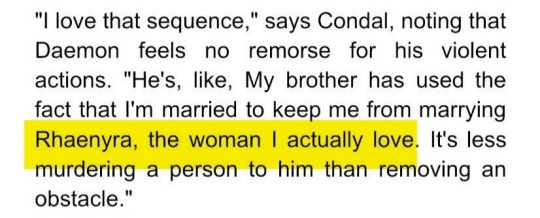
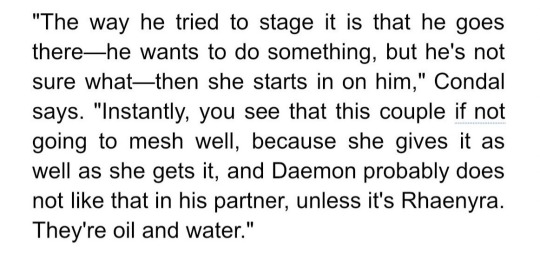
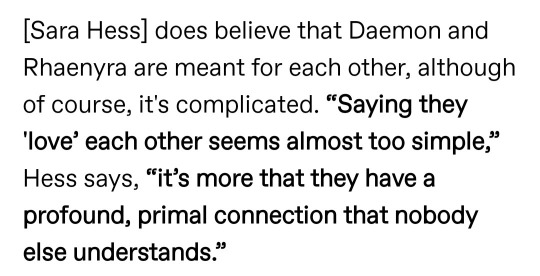
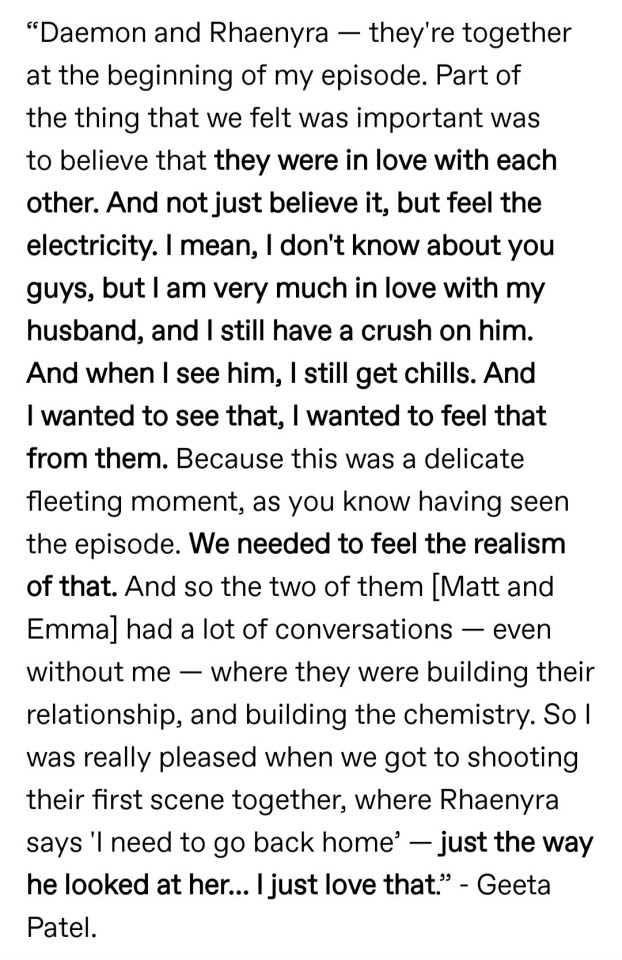
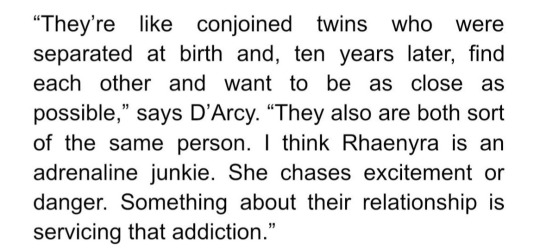
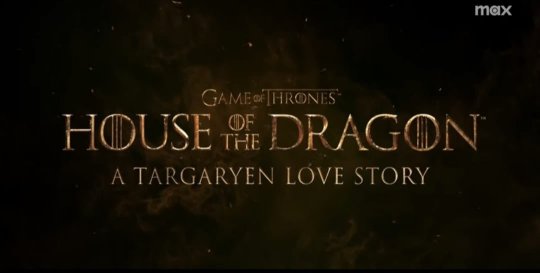
I will add that no, Daemon is not a pedophile either. Go to @nrilliree to get the definition because I'm clearly too lazy to explain again :
Especially since if you give me the example of the young prostitutes (which the antis also love to pass off as younger than they probably realistically are, like under 13 years old, just to make it really disgusting) when Daemon was in his 20s, know that they were all maidens.
“Maidens” is a term they use to refer to young unmarried women. In brothels these maidens were most likely between 15 and 17 or higher do to the lack of nutrition of the peasants. A bad nutrition causes someone's period to come later.
So no, they weren't little girls. This was for the time of young women literally according to society's of Westeros marriageable age.
The worst you can say about this case of prostitutes is that Daemon had a fetish for virgin maiden for a period in his younger years. (And even if it's obviously not great, I'm not sure #irony that we can put it on the same level as a groomer, a pedophile and a rapist... Yes I'm making an insituation in Aegon II for the last 2 points. We're getting there...)
Aside from that, Daemon was in a relationship with his then favorite, Mysaria, an adult, he also married Laena later, also an adult, and also married Rhaenyra when she was an adult (all according to our modern standards), although yes, he courted her when she was 14. But I remember that Rhaenyra had reached the age where she could marry and had already been courted by men. It's not surprising in the context that Daemon courted her. Especially since there is no evidence that anything sexual happened between them at that time. (One talking about sex is Mushroom, and we know to what extent he is obsessed with it and therefore that his testimony is almost worthless, and the second is Eustace, pro greens. And I remind you that the greens were already making up bullshit on Rhaenyra's sexuality before Daemon's return)
Basically, Daemon has always slept with maiden, and always of varying ages. (which is completely wrong with the definition of pedophile)
Limit, you can talk about ephebophile, but as @nrilliree already said, there is no evidence on this subject, especially since Daemon has also been with adult women several times (Mysaria for a little more than 1 year, Laena for 5 years, and Rhaenyra for 10 years), and this by our own standards modern.
Also, what makes me laugh is that these same people who will claim that Daemon only likes young girls who are essentially minors according to our time (because obviously they will look at age only according to our time, which is an error given that the historical context of this universe is completely different from ours, but in short), claiming that Daemon only married Rhaenyra for power and striving to say that Laena was 15 / 16 years old like in the HOTD show when he married her, while no, she was 22 in Fire and Blood. Well these same people will come and tell you and claim that Daemon did cheat on Rhaenyra with Mysaria, in addition to Nettles, during the dance.
An event whose veracity we also cannot prove and which seems somewhat strange when we take a closer look (so you will guess that I don't particularly believe in it either). See @horizon-verizon posts for that.
Why do I say it's funny ?
Well because Mysaria is an adult woman, much older than Rhaenyra and Laena.
But tell me... if Daemon is so obsessed with underage girls... why would he have slept with a former lover of his, who was already an adult at the time, and even older at this point there ?
We see that what really interests them is more to say bad things about Daemon whoever he is, rather than having any real consistency in their comments and accusations. (And if anyone dares to say that Daemon was sleeping with Mysaria to ensure he got her on his side... wtf ? Rhaenyra is the queen. She pays Mysaria and assures her safety. Why would sex with Daemon be the only way for Mysaria to ensure her loyalty to the team Blacks ? She literally hasn't seen Daemon in over 20 years I think. What would she care about him sexually or otherwise at this point, except perhaps for personal revenge ? And then, if Daemon really was with Mysaria to ensure her loyalty to his side... Well he's a bit much of an idiot if he really slept with Nettles after that. These people love to say that Daemon is a great master manipulator who places his pawns well in advance, especially when it comes to women, except that... Daemon does not seem to have been very intelligent if we follow this belief that I have already seen among antis, which is once again inconsistent with the speech Daemon was a master manipulator of women... I mean, according to their point of view, Daemon knew how to pretend for 10 years with Rhaenyra. Why couldn't he have lasted longer to play the charade with Mysaria ? Once again, the consistency of their words does not interest the antis. They only care about saying bad things about Daemon !)
And don't come for talk to me about Nettles, because I've already made some rather long posts on the subject, go see them if you want :
As well as I highly recommend the extremely in-depth analyzes of @horizon-verizon.
Basically, the story with Nettles could never be proven, and I personally don't believe it.
On the other hand, Aegon II is a character who could be described as a pedophile (by Westeros standards and ours) in Fire and Blood, having been with a girl (= child for Westeros. There is no adolescence in this society. Only childhood and adulthood. As a girl and not a maiden, a woman having her period and therefore marriageable, the individual with whom Aegon II was therefore indeed a child), and not a maiden, from precisely 11 / 12... And he's being also reported as having several inappropriate behaviors / touching towards women, strongly insinuating that he is a rapist (by the own maesters being on his side). And no, Eustace never denied the girl's age, and continued even though he referred to her as girl and tried to downplay the scandalous event.
And why am I talking about Aegon II fans ?
Because it's systematically them who come to me to tell me the bullshit about Daemon being a groomer and a pedophile while sometimes maintaining that their little favorite is not a rapist, and a potential pedophile.
Which is still pretty damn cheeky...
#daemon targaryen#pro daemon targaryen#the rogue prince#rhaenyra targaryen#pro rhaenyra targaryen#the realms delight#the black queen#queen rhaenyra#the dragon queen#the half year queen#daemyra#pro daemyra#daenyra#daemon x rhaenyra#rhaenyra x daemon#daemon and rhaenyra#rhaenyra and daemon#house of the dragon#anti house of the dragon#hotd#anti hotd#fire and blood#f&b#f&b spoilers#team blacks#team black#pro team black#pro team blacks#anti aegon ii targaryen
62 notes
·
View notes
Text
Round 1

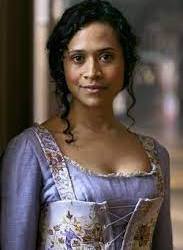
Propaganda Under Cut
Alana Bloom
she kissed will graham in s1 and dated hannibal in s2 so you can imagine how bad the fandom is to her. fun fact she's in a canon lesbian relationship now tho <3
The show literally does the yaoi treatment of victimisation for the benefit of the male leads to her. And then the fandom mistreats her
I'm not sure if this even counts but...Literally a victim of Yaoi along with several other characters in-series, but she got it almost the worst. The entire show is just people dying because the two male leads are OBSESSED with each other and can't be normal about anything. Alana Bloom, actual PhD of psychology and consultant to the FBI, got kissed by one guy, fucked and fed people-meant by the other, and pushed out a window by the murder husbands' forced-surrogate daughter. Like. Actual victim of several crimes caused by yaoi. She's probably one of the few examples of a Yaoi Victim overcoming and evolving past her yaoi-related trauma into a stronger person/character, though: She gets an entire character overhaul and a hot, millionairess for a wife. She kills a man with an eel. She becomes head of the BSHCI, effectively putting her in complete power over her jackass cannibal ex-bf. She does quite well. Unfortunately, the rest of her screen time is spent trying not to get killed in the ongoing fallout of Hannibal and Will's fucked up courtship, but hey. Can't have everything. I don't even know if I'm saying anything valid here: the fandom loves her, but I supposed her position outside of the Hannigram relationship relegates her to a non-subject in a lot of Hannigram-focused fanwork. She's an 'obstacle' to their relationship only in the sense that Will had a crush on her once that went nowhere and Hannibal started an actual relationship with her SPECIFICALLY to piss off Will. I guess she's also a more literal obstacle as Hannibal's jailer and Will's friend who's constantly pointing out to him that Morals exist and he should try having some of those, maybe.
Gwen
She stands in the way of Merthur, by far the most popular ship in the fandom. I haven’t seen it as much in recent years, but back in the days of fanfiction.net she got slut shamed so badly for having been romantically interested in three of the male characters over the course of the show, which is just... normal straight woman behavior, meanwhile Merlin crushed on pretty much every woman who even looked at him in the early seasons of the show and got no hate for that whatsoever. I barely even read Merthur fics (not because it’s m/m, just because certain aspects of their relationship don’t appeal to me) but the “Gwen is a slut” attitude was so pervasive across the fandom, even fics that weren’t explicitly anti-Gwen would “jokingly” call her a slut. I even saw a few fics demonizing her for having an affair with Lancelot despite the fact that SHE WAS ENCHANTED when that happened, and surprise surprise, Lancelot (who was also under the influence of magic) got none of that hate, and neither did Arthur, who got enchanted to fall in love with multiple women over the course of the show.
Canonically Arthur Pendragon's love interest and an important and interesting character in the show who's completely shoved aside and ignored in favour of the medieval bbc yaoi ship. At best they put her and Morgana in Lesbian Timeout (ie make them get together and then reduce them to wingwomen at best because god forbid we focus on the medieval bbc yuri). Justice for Gwen right now!
She is prince Arthur's love interest (eventually wife). Arthur is MADLY in love with her. He tells his tyrannical father he would give up his crown to be with her (she's a servant in the series). He forgives her cheating on him with Lancelot (!), which in the show is caused by an evil enchantment, but the characters never find out about it. He chooses her time and time again. His love for Gwen is literally never put into question. Many fans insist to this day that there was no chemistry between Gwen and Arthur compared to Arthur and Merlin. Arthur isn’t even particularly nice to Merlin most of the time! The funny thing is that Merlin himself ships these two so hard and does everything he can to help them get together!! Gwen & Arthur are adorable and too many fans were drunk on the yaoi fumes to see it. ARTHUR WAS A SIMP FOR GWEN.
262 notes
·
View notes
Text
Homestuck Reread: Act 4, Part 4/4 (p. 1865-1988)
Read the previous post here.
Oh boy it's the final stretch for this Act. I want to take a moment to express my appreciation for all the new followers I've gained over the course of this reread. I have 60 now, which is incredible. Thank you all!
With that said, this post will contain some... sticky subject matter. I wonder how many of you will choose to dip after this.
[CONTENT WARNING: Discussion of incest starts below the second image]

Oh my fuck it's the ectobiology section. Out of all the convoluted and frivolous mechanics in Homestuck, this one might be the worst in my opinion. Worse than the adventure game jokes cribbed from Problem Sleuth, worse than the punch card alchemy and other ponderous Sburb mechanics... I'd say it's worse than the time travel shit, but this is actually more of a subset of that. So yeah, time travel continues to be the worst thing about Homestuck, and shit like this and the bunny subplot are prime examples of that. But my ire is fully directed at ectobiology at this moment.
The stuff I mentioned before at least has a purpose; they parody needlessly complicated video game mechanics. But ectobiology doesn't have a purpose. It's not funny, nor does it serve the story in a meaningful or even interesting way. So why does it exist? Is it to drive home the point that these select individuals are the "chosen ones" by Sburb? If I had to hazard a guess what Hussie meant by that...
Earth is a vile place and must be destroyed, so sayeth Sburb. Everything living on it is flawed by extension, so its chosen destroyers must be fully disconnected human society and the planet itself. These destroyers have been plucked from the aether and reconstituted from bullshit plot slime in a faraway part of time and space, ensuring that they are unquestionably divorced from anything from Earth, and therefore pure.
Now that I type all that out, it's no wonder none of the kids were all that shaken up about bringing about the apocalypse. Considering that they're essentially game constructs with no actual ties to humanity, it really throws away any sort of conflict and sense of sacrifice brought about by destroying the planet. All the innocents who perished in the meteor showers? Eh, fuck them! They were all NPCs anyway. All hail the slime people!
Okay, I'm sure this wasn't Hussie's actual intent, but if there's no grander symbolism at play, what else is there? None of this adds anything to the plot. The fact that the main cast are non-humans is never touched upon and the whole thing reads as superfluous sci-fi garbage. The only significance the meteors carrying the babies had was that John's Nanna died from a meteor strike. But it was already suggested way earlier that she died because she was crushed by the Colonel Sassacre book.
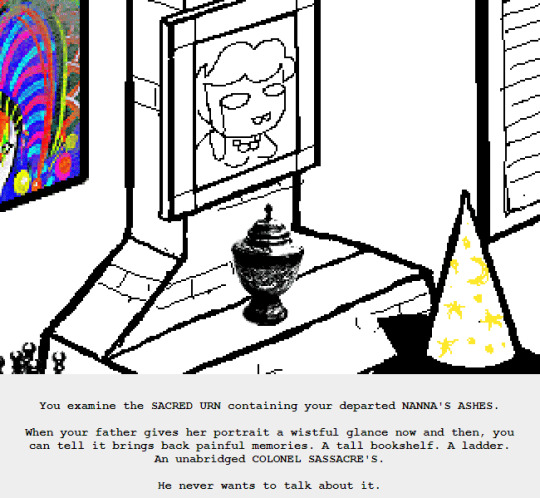
That was a perfectly serviceable, slightly comedic death befitting of a family of jokesters. There's no need to escalate it and involve a giant meteor.
One other thing I take umbrage with: because the cast were all birthed from the same slurry, this means that Dave and Rose are now """related""". They aren't related by blood, no, but by slime. Which, in the eyes of Hussie and the fandom at large, means the same thing, I guess. Even though they never grew up as siblings, lived separate lives in different parts of the country, and only met online as strangers before developing a (very flirtatiously charged) friendship, the fandom treats them as if they're flesh and blood brother and sister. It boggles my mind. Why is this being treated as legitimate? Did Hussie plan all along to take the two characters with the best chemistry only to pull a Luke and Leia on us? Why would he write them like that if this was his endgame? Does he just have an incest fetish?
I wouldn't doubt it because themes of incest are actually quite pervasive within Homestuck. And that's without even mentioning how Hussie developed an alien race that fundamentally relies on incest to reproduce. Ectobiology creates several relationships, incidental or otherwise, that tie nearly the entire main cast in a complicated web of pseudo-familial dynamics. Like John is actually the kids' progenitor/father because he's the one who brought them all into existence. So even if he isn't related to Rose or Dave by genes or slime, he still gave birth to them in a sense.
I've even seen people say that since Betty Crocker/The Condesce was Nanna's adopted mother, that makes the Egbert/Crocker/Harley/English family tree "related" to the Peixes trolls, so any ship with that combination is "incest." What if I told you that Feferi is related to all the other trolls via bullshit slime mechanics as well? I guess that makes Johnkat incest too. And if John is Dave's father... gasp! Davekat is also incest!? It's over folks, burn everything down.
Anyway, I don't acknowledge Rose and Dave as biological siblings because I don't treat being born from a vat of slime as the same as being birthed from the same womb. That would be treating ectobiology as valid and sensible, which I refuse to do. I don't want to lend Hussie's fixation on incest any amount of approval. All I know is that the trolls are made of the same stupid plot sludge and nobody cares if you ship them. There are no humans and trolls: only slime constructs. Either everyone is related or none of them are. You can't have both.
In the end, none of this matters. The world would be a much happier place if we all collectively agreed to forget ectobiology's existence. If this ruffles your feathers, just block me. Don't come at me because I'll just ignore you.
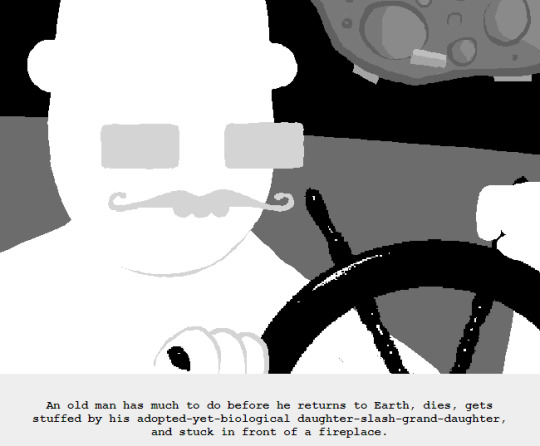
So Grandpa Harley had time-traveled forward to the future and into Sburb before returning to the past, living out his life on Earth, and dying. Fucking okay I guess!
At least this answers the question I had that yes, Mom Lalonde knew what she was doing before entering the game because Grandpa told her everything. Same with Bro and Dad, it seems.
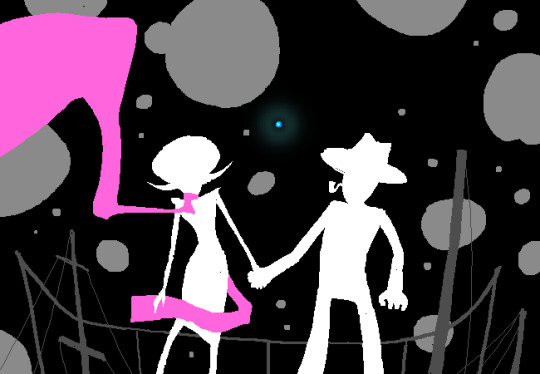
Ah yes, Dad x Mom. A relationship that ends nearly as soon as it begins. Let's put this right alongside the Exile love triangle and DaveTav in the "relationships that are teased but never manifest into anything meaningful" pile.
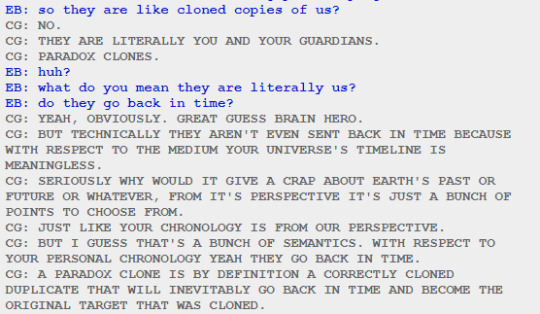
"Ackshually, everyone was born from a vat of slime on a distant meteor and sent back to Earth to live out their lives!" - the ramblings of an utter lunatic.
Like god fucking forbid the kids be normal people placed in extraordinary circumstances.
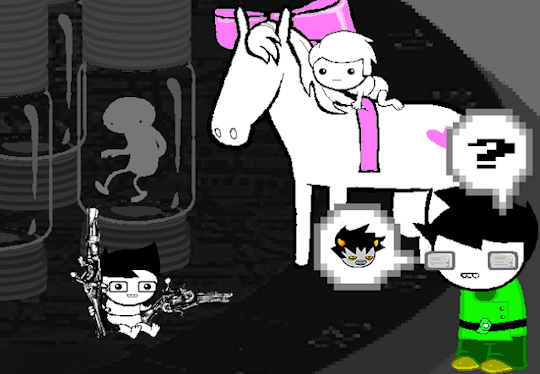
The babies all gravitate to the things they'll have a connection to in the future. Nanna gets her son's hat, Bro gets Cal, etc. Dave clings to Maplehoof, which doesn't seem like a clear connection. Except... that's Rose's horse, isn't it? Ohhh. It all makes sense now. 😏
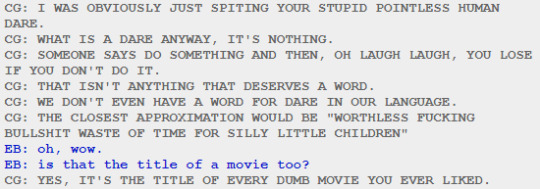
This exchange is a top 10 Karkat moment for sure.
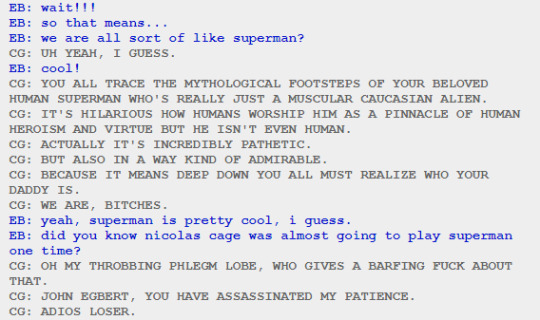
The supposed saviors that will revive the human race aren't even human, they're slime creatures! Beyond the fact that none of them are human, the Superman analogy falls flat because none of these kids are humanity's protectors. They're just following the whims of a game that ultimately does not give a fuck about any of them.
I need "JOHN EGBERT, YOU HAVE ASSASSINATED MY PATIENCE." emblazoned on a banner or something.
Also Karkat calls Superman a "Caucasian alien" and he also refers to a genie as an "Earth Arabian" in an earlier log.

He really knows a lot about different human ethnic groups, for some reason.
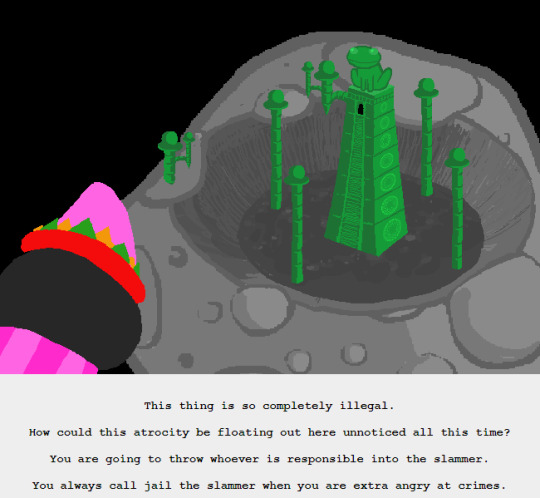
I think about "you always call jail the slammer when you are extra angry" on a somewhat regular basis.
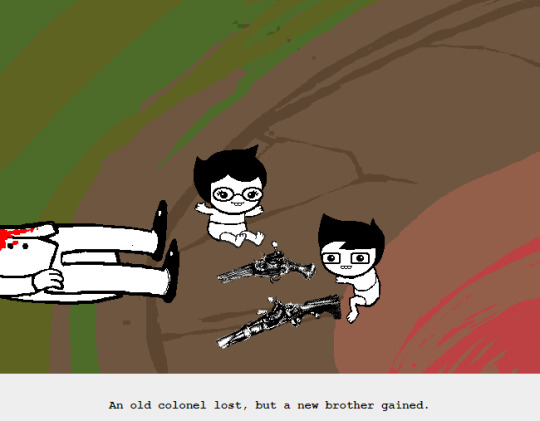
Sassacre is killed, but since he was a human, his death is inconsequential. Grandpa, a slime homunculus just like Nanna, is given new life, which is a cause for celebration. This whole sequence is quite morbid with Sassacre's bloody corpse just hanging out in the frame.
But wait, if Nanna and Grandpa are adopted siblings, and John and Jade are their "genetic children"... augh, never mind! This is what I mean when I say ectobiology produces all kinds of unfortunate relationships. I don't want to think about any of this pseudo-incest anymore. How are there people who make it their whole online careers to dissect this garbage so they can harass people about this shit? Don't they get tired? It's giving me a headache.
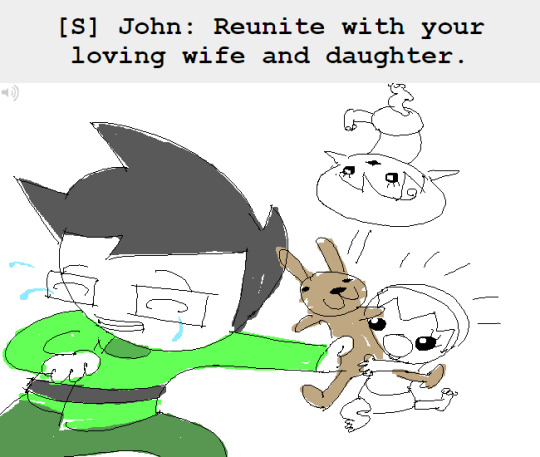
Rose is even referred to as John's "daughter" in the title of this flash. I'm not just blowing smoke when I say that John is everyone dad. That's literally what just happened.
Now that we're finally done with this segment, I'll cap it off with this: Nothing of value was added with the inclusion of ectobiology. I know I've been throwing around the phrase "waste of time" in these posts, but this bit of worldbuilding is unequivocally, without a doubt, the biggest fucking waste of time in this entire comic.
Woof. Shall we move on?
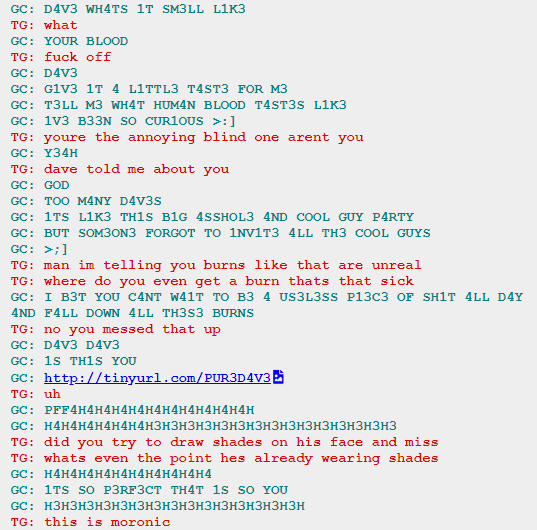
While Davesprite and Terezi sort of reconciled in their conversation and formed a bit of a bond, Dave doesn't receive her nearly as amicably. Why is she doing the "1S TH1S YOU" joke with Dave when that was a bit she did with Davesprite?
Oh right, because she thinks that same relationship will carry over to "real Dave". She sees them as the same person just like everyone else. Lovely.
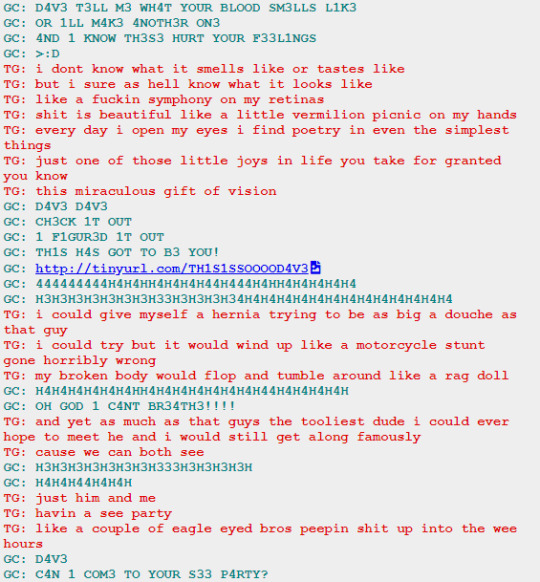
Dave thinks he can burn Terezi by repeatedly insulting her blindness, even though it's clear that it doesn't bother her at all. This is really weak, especially when compared to his log with Tavros where he forced Tavros to block him.
Terezi seems to have completely given up on John and now wants to be annoying and nasty to Dave instead. She has officially been downgraded from minor antagonist to obnoxious interloper.

Tavros could only ever enjoy himself when he could escape to Prospit, be mobile, and most importantly fly. Nobody ever wants to talk about how Tavros has a lot of avoidance issues, how he always shrinks away from action and confrontation, and how he copes with adversity through escapism (both in a figurative sense through his interest in fantasy, and in a literal sense when he dreams on Prospit). A big part of his character comes from Peter Pan, the archetype of childlike escapism! IDK man, it sucks to see people reduce him to this lovable, pure-hearted woobie while ignoring the key part of his character.
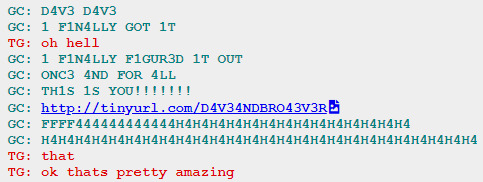
Just like with Davesprite, Terezi just needed to send the right drawing for Dave's opinion of her to flip. Fantastic conflict resolution right there.
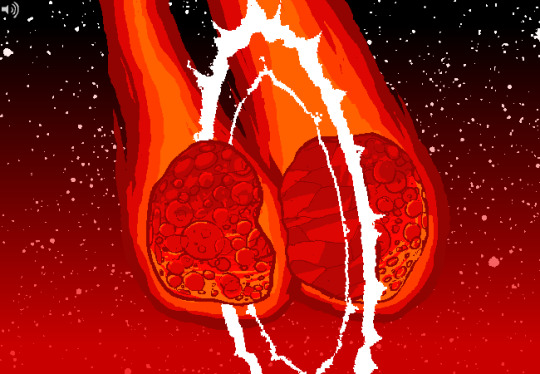
[S] Descend is the End of Act flash for Act 4. It might be the most ambitious flash up to this point. Lots of guest artists contributed here, and it's at this point where Homestuck really begins to feel like a much more collaborative project instead of solely Hussie's work. I don't mean to discredit the music team when I say that, because they've been around since the start, but this feels more substantial since Homestuck is a primarily visual work.
Anyway, Bro slices a meteor in half to save Dave's life, and later has his rocket board transport Dave into the game safely. Chalk that up to his list of noble deeds to try and balance out his dastardly ones.
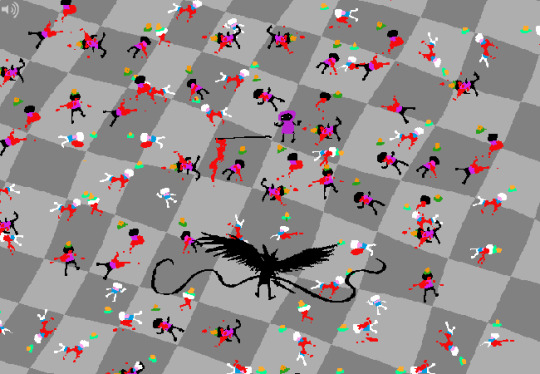
Jack fucks shit up indiscriminately, so why does he spare WV? Feels a little out of character for him.
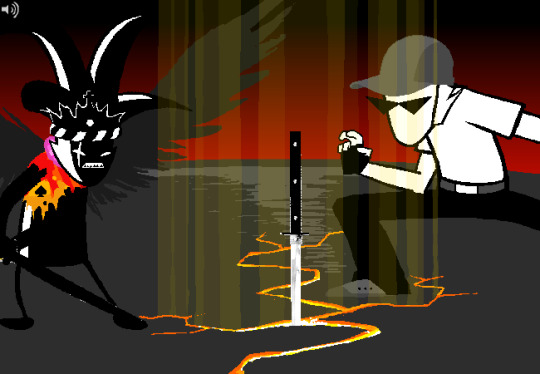
The brief Jack and Bro fight is pretty sweet. I'm not a shonen guy, but I'm getting that same sort of energy from this. Knowing that Bro probably knew all about the kinds of monsters he'd have to fight in Sburb, he has probably been training for something like this for most of his life. Had Jack not gotten god powers, Bro probably could've wasted him.
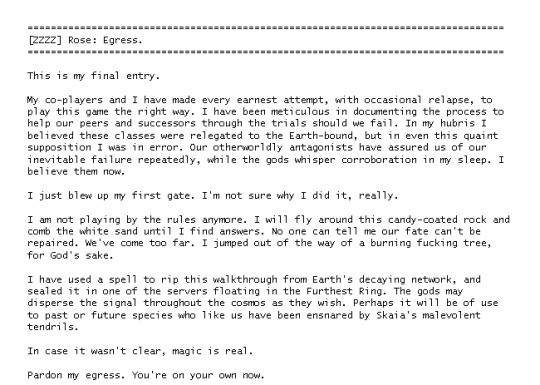
I like to think that Rose's merging with her doomed self is what causes her to act so destructive and nihilistic from this point on. She wants to destroy the game that killed her.

So okay... when Dave and Rose gave John their bunnies for his present, both of them clearly put a lot of thought in their gifts. Dave gifted him a piece of merch from his favorite movie. Rose restored an old heirloom using John's previous gift to her. Jade assembled "a fun and completely ridiculous thing" that has no sentimental meaning and only carries a vague sense of importance.
Does she just not know what he likes? This is less a gesture of friendship and more of her blindly fulfilling the whims of Sburb. I really struggle to see how Jade fits in this friend group dynamic. She's like the weird kid that the others let hang around out of pity.
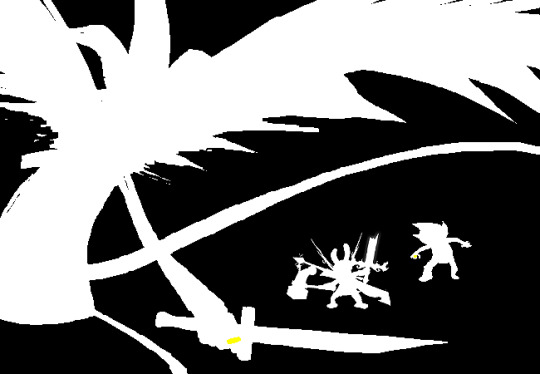
Waow! After all that buildup with the box mystery, the bunny and Jack are going to have a showdown! Finally we can see what all the fuss is about and why this bunny is so important.

... Or Jack can just fly away and they never fight at all. Cool Hussie. It's so cool how you spent several pages devoted to this plot point only to let it fizzle out like this. Incredible writing.
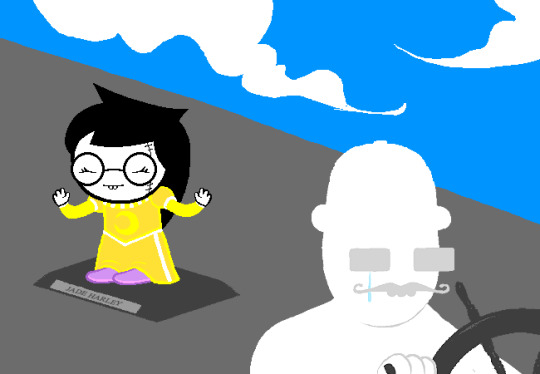
How much time do you think elapsed between Grandpa bringing Dream!Jade's corpse aboard his airship and gutting, cleaning, stuffing, and mounting her? He probably did it all after he flew off, but I like to imagine him doing this all before that while Mom and Dad just stood around awkwardly waiting for him to finish.
Act 4 had its ups and its downs. A lot of downs. The ups also felt a little bittersweet because for every intriguing story hook like the Exile love triangle, Dave's relationship with Tavros, Rose and her mother, or anything involving Davesprite and doomed Rose, they all amount to nothing in the grand scheme of things.
Homestuck truly is a collection of fun ideas all unfortunately cobbled together by someone who doesn't know how to properly execute them in a story. The colorful art and the kickass music can only serve to cover up the flaws so much before the veneer peels and you see the ugly cracks underneath. I wish we lived in a world where Andrew "writing is easy" Hussie had an editor to salvage the good stuff and throw shit like ectobiology into the garbage.
If it sounds like I'm wrapping things up, think again. This journey isn't over yet. It's time for Act 5! People like to joke about how you should skip all the way to that one, but after everything I've read so far... I wouldn't blame anyone if they did.
Read the next post here.
#homestuck#homestuck reread#cw incest#john egbert#rose lalonde#dave strider#daverose#jade harley#grandpa harley#dad egbert#mom lalonde#bro strider#nanna egbert#karkat vantas#terezi pyrope#tavros nitram#aimless renegade#jack noir#wayward vagabond
34 notes
·
View notes
Note
What would happen if multiple female noble drow go after the same male for whatever reason? Would they fight for him? Would he go to the highest ranked House? Because he definitely wouldn't get to choose lmao or would it just end in him being a prostitute, for lack of a better word?
Alternatively, is there a difference between consort and patron in the drow world?
ily
Such a scenario - when two or more noble drow females go after the same male and none of them is willing to give up - is probably every male's worst nightmare.
🕷️ When one of the females has significantly higher station, her rival - or rivals - may show some common sense and back off. Things start to get complicated, though, when the females are of equal or nearly equal station. Then... well, the conflict can get pretty messy, and the male can end up dead.
Sharing is not really an option, because drow females, especially powerful ones, typically do not share. To some degree, it is a matter of possessiveness, control and pride - but also a matter of safety, since "shared" lover could easily become a spy.
🕷️ Eliminate The Rival - a noble drow female trying to kill another noble female over some male is an unlikely scenario, especially when both females are mature and level-headed. To such females, no male would (or should) be that valuable - also, openly fighting for a male could make both of them a subject of mockery.
Still, it can happen, especially when females are young and / or hot-headed, and dislike each other for some time - then the assassination of the rival becomes a tempting option. In the end, the winner gets the prize.
🕷️ Claim The Male First - this applies to a situation when a powerful female wants to officially claim some male as her consort (or patron), but one or several other females also desire him.
If the female is a matron mother, she can, for example, arrange for the male to be discreetly kidnapped and delivered to her doorstep - Matron Malice Do'Urden "obtained" Zaknafein in a similar way. Male officially becomes a member of her house and her consort / patron, and then no other female can have him - not without matron mother's permission, at least.
If the female is not a matron mother, but she is still a noble, she can, for example, convince the matron mother of her house to give her some support - claiming a valuable male as a member of the house can strengthen it, after all.
If the female is on good terms with matron mother and she serves her house well, I suppose that she may even ask to be given a specific male as a reward.
🕷️ If Not Mine, Then No One Else's - even if one of the females finally "wins" and claims the male as her lover, it does not necessarily mean that the conflict no longer exists - on the contrary!
Her rival can, for example, arrange for the male to be killed only to spite her. She can also try to take the male away from her, sometimes only to torment him and / or to kill him - to make sure that he will not be taken back.
🕷️ Male's Misery - many drow males dread attracting the attention of two or more competing noble females. They know that females perceive them only as playthings - and just like it sometimes happens with unfortunate playthings, they may end up being torn apart in such a conflict.
It is said that some very handsome and very popular drow males try to avoid this fate, deliberately making themselves less desirable to females - by acquiring ugly face scars, for example. It usually makes them lose their status, but it can also save their life, since females typically lose interest in them.
🕷️ Patron And Consort - basically, every patron is a consort, but only some consorts are patrons.
Patron is the favoured consort of matron mother of the noble house and (usually) the father of her children - it is one of the highest ranks possible for a male drow.
Consort is one particular male selected by a female drow (of any rank) to be her... well, not a partner, but more-than-an-occasional-lover. Consort is typically expected to be loyal, obedient and good-looking - he is bound to fulfill the female's wishes and to protect her in case of danger. In exchange, he usually receives some measure of female's protection and more or less wealthy gifts - sometimes also the female helps a talented consort to propel his career forward, if only for her own benefit.
One female can sometimes have multiple consorts. She can also have female consorts (of lower social status than her).
25 notes
·
View notes
Note
I think my ego is getting in the way of my writing. It's confusing, because I doubt my ideas and writing, but I still feel competitive in a way. I don't like reading about others' WIPs, I avoid reading the genre I want to write, and I automatically dislike authors who's already published a book similar to any of my WIPs. I quit the ACOTAR series because the themes were too similar, and I'm scared of Priory of the Orange Tree because the worldbuilding has intense good praise. I need an egodeath.
Case of Strong Ego or Low Self-Confidence?
If you're doubting your ideas and writing, I would question whether it's actually your ego getting in the way and maybe not just good old-fashioned low self-confidence. The reason I wonder is because your dislikes and aversions all sound fear-based to me. For example, if your ego were an issue, you probably wouldn't dislike or avoid authors who did something similar... you'd more likely scoff at their relative inferiority and boast that you did it better. You wouldn't be afraid of a book because its world building received good praise... you'd roll your eyes and say you don't know what people are going on about, because your world building is so much better.
Dislike and aversion instead seem to indicate jealousy and self-doubt. The good news, however, is that low self-confidence is actually pretty typical for writers and it's something that gets better with time.
Here are some things I hope will help boost your confidence, or at least give you hope that it will get better:
1 - Writers with big egos probably aren't as great as they think they are. In reality, storytelling is a craft no one can truly master, because reader appetites, story material, and even mechanics to a degree all evolve over time. What makes a good story is also very, very subjective. There are people who consider Jane Austen one of the best writers to ever grace the Earth, and there are people who think she's one of the worst. I think truly good writers can know that they're good without thinking everyone else is beneath them.
2 - You can't doubt your ideas and writing without understanding where you want your ideas and writing to be. In other words, you know what good ideas and good writing sound like to you, which means your taste and style are intact... you just have a little bit further to go to get your own ideas and writing where you want it to be, but that's okay. Going back to #1 a bit, writers don't hit some magical peak early on and level off at greatness. There's a lifelong upward trajectory with each book being a little bit better than the last. And sure, it's not a perfect upward trajectory. You can have periods of leveling out or even dropping off, but most writers will continue to get better over time. So, again, it's okay that your writing isn't quite where you want it to be, because it's that feeling that drives us to get better and better and better. This shows you're on the right track!
3 - Those similarities aren't the big deal you think they are... I've been at this a long time, and I'm going to tell you right now: stop worrying about "similarities" in other books. I've posted about this a lot because it's a common concern, but similarities are a dime a dozen in fiction. For every book about a high school girl who falls in love with a vampire, there are a dozen more. For every book about a woman who quits her big city job after a divorce, moves home to her small town, and falls in love with her childhood nemesis, there are at least twenty others. There are countless stories about young women getting wrapped up with fae princes, sad boys/men whose lives are invigorated by a Manic Pixie Dream Girl, murder mysteries set in quiet fishing villages, horror stories set in dilapidated old mansions someone just inherited from a long lost aunt, kids or adult who learn they've secretly been magic all along and get roped into fighting a Big Magical Bad. There are over 100 million books in existence, and that number increases by hundreds of thousands every year. You're never going to write a book that doesn't have similarities with dozens of other books, so stop worrying about it. Remember, it's not the similarities that matter... it's everything else... all the things that only you can do.
4 - Similarities are actually a good thing. The truth of the matter is, similarities are actually a good thing. That's why you can look back through cinematic history and see major trends... monsters, westerns, musicals, disasters, sci-fi, action, epic adventures, rom coms, superheroes... It's why when a book about a young woman toppling a dystopian regime becomes massively popular, dozens of other dystopian books hit the shelves the following year. It's why we gravitate toward favorite genres and tropes and comfort shows. Its why we go to the same restaurants and stores over and over again instead of going to a brand new one every time. Humans like a bit of repetition, and if your book has similar world building to Priory of the Orange Tree, that's a bunch of readers who are going to gravitate toward your book.
5 - There's only so much material to go around. I was interested in the fact that your concern about ACOTAR was that the "themes were too similar," but I promise you, those themes are in a million other stories. When it comes to tropes and themes and character arcs and magic systems and settings and... all of it... there's only so much material. Themes aren't something that are created from nothing. You can't make up an original theme that no one else has explored. Themes are inherent to human existence. They're truths about humanity that beg to be examined and explored. It's not the themes that matter so much as how they're explored and what you say about them, and even if there were similarities there, odds are there were far more differences.
I hope this resonates and helps. I hope I was right that it's more of a self-confidence issue than an ego issue. And if I was wrong, maybe something here will still resonate. You might spend some time in the "writing-related fears" section of my Motivation master list to see if anything there resonates, too. ♥
•••••••••••••••••••••••••••••••••
I’ve been writing seriously for over 30 years and love to share what I’ve learned. Have a writing question? My inbox is always open!
♦ Questions that violate my ask policies will be deleted! ♦ Please see my master list of top posts before asking ♦ Learn more about WQA here
44 notes
·
View notes
Note
Why the fuck conspiracy theorists love to use pop-culture as an explanation for things so much?
"OMG, world is a simulation, just like Matrix!"
"OMG, Back to the Future described Project Monarch!"
"OMG, Mandela Effect is just like Dark City!"
and uncountable others
There's multiple overlapping reasons, most of which stem from assuming that the entertainment industry is controlled by The Conspiracy.
The most straightforward one is the belief that the Conspiracy uses entertainment to brainwash people into accepting heretical beliefs and degrade their morals.
Conspiracy theorists also claim that the Conspiracy puts "predictive programming" into media in order to brainwash their audience into accepting whatever evil scheme they plan to spring next, regardless of how the story frames its subject matter. (Seriously, a narrative can be like "do not build the Torment Nexus!", and these people will claim that the Illuminati is brainwashing people into accepting the existence of the Torment Nexus. Conspiracy theorists are among the worst bad faith readers on the face of the planet.)
Another belief that's developed (and I couldn't tell you its exact origins, but it's highly popular among the types who claim Project Monarch is a real thing) is that the Conspiracy cannot act without announcing their evil plans to the world in some way. Supposedly, this is just one of the requirements of getting your power from Satan. So allegedly, the New World Order people are creating movies that announce their plans to the public by working them into fictional narratives. (And again, it's a form of extreme bad faith reading.)
One other reason is that a lot of media is influenced by conspiracy theories. For example, nearly anything with aliens or Atlantis has been influenced by conspiracy theories to some degree. The Matrix was very much influenced by conspiracy theories. That doesn't mean that this media is all inherently bad, but it does mean that anyone looking at the world through a conspiratorial lens is going to recognize their own beliefs and language, and read it as a kind of validation.
Conspiracy theories also serve as a way to maintain belief in things that scientific evidence doesn't support or even precludes. Like where a more well-adjusted person might accept that dainty little unicorns aren't real animals but write them into a fantasy story because they like the idea of them, a conspiracy theorist type might essentially believe that dainty little unicorns are real animals, and the big elite meanies are hiding it from us.
There's probably more dimensions to this than I've covered here, but yeah, in my experience, this is what a lot of it comes down to.
#answered#conspiracy theorists#conspiracy theorist#conspiracy theories#conspiracy theory#conspiracism#conspiratorial thinking#media#pop media
26 notes
·
View notes
Text
Magical Theory: Categories of spells
Look, for all of his qualities, Prof. Fig did not teach us much about Magical Theory. So I guess I’ll just make my own lessons! Interested students, come in, come in! You can make some room on this desk over there! Yes, put all those books on the ground, it’s alright. Sit down and let’s discuss! (And I hope you have some time to spare because this will be long!)
Lesson 1: Categories of spells
There has already been a lot of discussions within the fandom about the basics of what Magic is, especially about how it requires intent and/or emotions in addition to an incantation and wand movement to work. I myself have already participated in this discussion (although my point of view on this has evolved a little bit since then) and I can direct you to many other sources on the question (yes, each of these words is a different link you can go look up for further reading!). So I won’t be talking about this today and instead we will focus on the different type of spells that exist and see if we can neatly group them into different categories. In other words, let's see if we can define a taxonomy for spells.
So let’s start at the beginning by defining what a spell is. The Harry Potter Wiki, citing as source the game «Wonderbook, book of spells», tells me that a spell is:
"a controlled manifestation of magic that affected the world in a supernatural fashion."
And further:
"Generally cast by a witch or a wizard, spells were often produced with certain wand movements and a verbal incantation, or for more experienced witches and wizards, silently and wandlessly."
So I would say that a spell is any magic cast from a wand with a particular intention and a specific intended effect.
Within the HP books we hear of different kinds of spells: Charms, Hexes, Jinxes and Curses. So what differentiates them? JKR herself admits that the boundaries are flexible and that every wizard or witch classifies different spells differently.
For some insight on how JKR decided to name the different types of spells within the books, here is what she says:
Spell: The generic term for a piece of magic. Charm: Does not fundamentally alter the properties of the subject of the spell, but adds, or changes, properties. Turning a teacup into a rat would be a spell, whereas making a teacup dance would be a charm. The grey area comes with things like 'Stunning Spells', which on balance I think are Charms, but which I call spells for alliterative effect. Hexes: Has a connotation of dark magic, as do jinxes, but of a minor sort. I see 'hex' as slightly worse. I usually use 'jinx' for spells whose effects are irritating but amusing. Curses: Reserved for the worst kinds of dark magic.
The lack of consistency in naming different kinds of spells throughout the books is frustrating for those of us trying to make sense of it and figure out how magic works, but we have to admit that this type of vague and variable naming is actually very realistic. Throughout the books, we never meet any wizard scientist or wizard philosopher (apart form Dumbledore I suppose) that talks about Magic in a scientific/philosophical way, with strict definitions. What we encounter is wizarding vernacular language which tends to be inaccurate.
In fact, we muggles are equally as inaccurate when naming things. Take for example what we call ‘vegetables’. Vegetables, scientifically speaking, don’t exist. There is no category of things, biologically, that are vegetables. What we call vegetables are actually an ensemble of fruits, roots, stems and leaves from different plants. There is no reason why we should name an apple a fruit and an eggplant a vegetable, when they are, in fact, both fruits. What we do call fruits tend to actually be fruits, so there is that. But then there is the whole mess of berries! A strawberry isn’t actually a berry (and it might not even be a fruit!) although an eggplant is. All that to say, if aliens landed on earth and tried to establish a taxonomy of edible plant parts based on our vernacular language, they would probably be confused as hell and might even exclaim: «This makes no sense! There is no structure! No rules! Horrible world-building!» when, in fact, there is a structure and biologists know this structure (more or less) it’s just that the average person does not care about this structure and categorises things by different standards such as how they are used (vegetables are usually cooked and eaten in savoury meals while fruits are eaten raw for dessert).
Anyway, the lesson we should take from that is that, when trying to understand and classify different types of magic, we should not rely overmuch on the names given to such magic by characters from the books. This also goes for what is called Dark Magic (as opposed to all other types of magic). Again, there might be an actual scientific or philosophical definition of Dark Magic but I don’t think the average wizard cares about that. I think that, in the Wizaring World (as in our muggle world), societal/political views dictate what is considered Dark Magic more so than an actual definition with clear rules and criteria. Any magic deemed unacceptable socially is called Dark Magic. It could explain why the Imperius Curse is called Dark Magic, since it has been outlawed so is clearly not socially acceptable, while the Memory Charm (Obliviate) is never called Dark Magic (even though it is equally as invasive and harmful to the person it is cast on) since memory modification is legal and is frequently used by wizards to protect themselves against muggles by upholding the Statute of Secrecy.
And, by the way, we can notice that this arbitrary societal classification into Dark/Not Dark Magic also affects the naming of the different types of spells since the Imperius spell is called a curse (bad connotation, considered the most harmful) and memory modification is called a Charm (good connotation, the most harmless of all the spell types, is considered to not fundamentally alter the properties of the subject it is cast on) even though the Memory Spell more fundamentally alters the mental properties of the subject it is cast on (the memory is erased pretty much permanently, or at least it is very difficult to retrieve it) than the Imperius Spell which is only temporary, with no fundamental change done to the subject of the spell who returns to normal as soon as the spell ends. So, by all means, according to the general definitions given, it should be called the Imperius Charm and the Memory Curse!
So if we cannot trust the vernacular classification into different types of spells as encountered in the books, maybe we can identify other common characteristics or dimensions of spells to distinguish different types of magic.
My personal working theory is that the duration of a spell’s effect is a major dimension to consider to distinguish different types of magic (and might even be used to distinguish Dark from Non-Dark Magic, but that’s a topic for another lesson). The ‘duration’ of the spell is basically: how long does a spell continue to have an effect after the caster has stopped focusing on it. Thus, the ‘duration’ property also interacts with a property of spells being self-sustaining or not. This might become clearer as I explain.
We have several examples of spells of very short duration, which I will call perfectly ephemeral spells, i.e. spells that stop having an effect as soon as the spell is done being cast. It’s many of the basic spells that we know: Accio, Wingardium Leviosa, Aguamenti, Incendio or others. As soon as the caster stops concentrating and exerting their will, an object hit with Accio or Wingardium Leviosa will drop to the ground. Same with Incendio or Aguamenti, as soon as the caster stops willing fire/water from erupting from their wands, it stops.
When casting perfectly ephemeral spells, the caster is perfectly in control, there is no chance of the spell escaping out of their control (unless it’s cast improperly) because as soon as they stop feeding their intention and will into the spell, it stops. For this reason, we can also call these spells non self-sustaining. They cannot operate without a wizard’s active will and intent.
To complicate things a little bit, within the category of perfectly ephemeral spells, we can add some spells that are short-lasting because their intended effect itself is short-lasting or transient. Expelliarmus, for example, seems to be a one and done thing: the wand is knocked out of your opponents hands and that’s it, the spell is done. You cannot keep the spell going, even if you wanted to, because you cannot keep knocking a wand out of someone’s hand, once it’s out of the hand it’s not possible to knock it out anymore. (Of course, you could have a spell that permanently repels the wand of your opponent from their hand, so that each time they reached for it, it would be knocked back again, but I think that would be a different spell.) Alohomora would also be a spell that has to be transient and short-lasting. Because of this particular property of the spells’ effect, it’s impossible to call such spells self-sustaining or not, since there is nothing to possibly sustain. The intended effect cannot continue to be applied.
On the opposite side of the duration spectrum, we can consider perfectly permanent spells. I suppose it’s actually impossible to say for certain what spells are perfectly permanent because it would require observing them over an infinite amount of time to be able to say with certainty that they never stop or weaken. So, one degree removed from perfectly permanent spells, we can consider very long-lasting spells, spells that have endured for several centuries without getting weaker. Those would include all the Hogwarts wards and protection spells and other enchantments like the ever changing floor plan. Those have endured for over a millennium and still remain very strong. We should note though that it is possible that those spells did weaken over time, we just don’t know since nobody was there in the 10th century when they were cast to know exactly how powerful they were then. Even if they have weakened over time, the fact that they are still powerful spells such a long time after they were cast still qualifies them as ‘very long-lasting spells’ in my opinion, and we can indeed make the approximation that they are permanent.
If we venture a bit beyond the category of ‘spells’ to consider magical objects (likely affected by a spell that gives them magical properties) we have the Deathly Hallows which continue to be powerful magical objects with the same intended effect centuries after their creation. We can add the Relic of the Dead that Sebastian finds in the Feldcroft catacombs that still works after centuries of sitting there unused.
Such very long-lasting spells seem to be self-sustaining because the spells’ effects continues to work long after the original caster stopped focusing on casting the spell (feeding it their intention), and even long after the original caster’s death.
Working back down the ‘spell duration’ spectrum from permanent to ephemeral spells, this is actually an interesting distinction we can make: spells that continue to work after the caster’s death versus those that don’t.
We know that some otherwise long-lasting spells are abruptly stopped when the caster dies. One example is Dumbledore wordlessly casting an immobilisation charm on Harry just before he gets disarmed by Malfoy (and then, Spoiler Alert!, killed by Snape) up on the Astronomy tower at the end of book 6. Since the spell was cast without incantation, we don’t know exactly what spell it was. It looks like it was Petrificus Totalus since Harry suddenly feels himself becoming rigid and immobile and he falls backwards against the wall. This looks very similar to the effects of the Petrificus Totalus curse cast by Hermione on Neville in the first year. We know Petrificus Totalus is one of the long-lasting spells that seem to sustain themselves even after the caster has stopped focusing on it. We have several examples of people staying petrified even after the caster leaves the room to do something else. I suppose a gifted wizard would be able to sustain the spell ‘distantly’ even while doing other things but, most of the time, we see Petrificus Totalus cast by young students (including first year Hermione) and I don’t think students have the mental capacities to distantly sustain a spell like that. So we can assume that the spell is long-lasting because it sustains itself somehow. Anyway, back to Dumbledore! He casts this spell on Harry and the spell continues to work up until Dumbledore dies and Harry is suddenly ‘unpetrified’.
This instance of a spell being terminated by the caster’s death might be why many seem convinced that any curse will stop with the death of it’s caster. But, in reality, we also have many more examples of spells or curses that endure after the original caster dies. In the last book, Crabbe casts the Fiendfyre spell and is killed by said spell, yet the flames continue even after his death. I’ve already mentioned several powerful magical artefacts whose magical effects endure long after whoever created them died. We also have examples of curses placed by old Egyptian wizards on their tombs that are still active centuries later (mentioned by Ron in Prizoner of Azkaban) and, in HL, the curse placed by Marmaduke Dale on the Dale family crest at the end of the 14th century that still affected Samantha’s brother 500 years later.
Of course, it is not always so easy to distinguish was is truly long-lasting or simply a transient effect which introduces long-lasting change. Two interesting examples to mention here are Avada Kedavra and Blood maledictions. Are these spells long-lasting or not? They certainly seem to be long-lasting! Regarding Avada Kedavra: once you’re dead, you stay dead forever, nothing can lift the spell; and regarding Blood maledictions: they endure after the original caster is dead and continue to have effects over several generations.
But, regarding Avada Kedavra, anyone would understand that the spell itself is not actually long-lasting, one can take a life in an instant and that momentary effect remains permanent because that is just how Death works. You don’t forever continue to kill someone, you do it once and they stay dead.
Blood maledictions is a more murky case. It could go either way. You could have a spell that continues to have an effect on someone and their descendants forever. But, on the Harry Potter wiki, it says that this curse actually produces a genetic defect that is then passed down to the descendants, hence why the curse endures. Then, the spell does not need to have a continuous or long-lasting effect. A moment is all it takes to create the genetic mutation and then the magic is done but the change made is permanent and has consequences over several generations. (As an aside: they cite The Cursed Child as a source for blood maledictions being genetic mutations. I have gone through the mentioned scene in the The Cursed Child and nothing about genetics is mentioned so I don’t really know where they get this from but whether blood maledictions in canon are genetic defects or not does not matter, we can still use this as an example to illustrate how this curse would be classified if it was a genetic mutation)
Going back to our ability to distinguish truly long-lasting spells from ephemeral spells with long-lasting change, in the case of Avada Kedavra and Blood maledictions we can say these spells are not actually long-lasting (their effects don’t continue in time) but have brief effects that produce long-lasting change because we know how these spells work. However, for spells with unknown mechanisms of action it is possible one would confuse truly long-lasting continuous effect with a singular, instantaneous effect leading to a permanent change.
To explain more clearly what I am talking about, think about the spell Alohomora. I think everyone would agree it is momentary: it unlocks the lock and then the spell is done. The spell does not continue to unlock the door, once unlocked, the door stays unlocked. This is what I mean by ‘brief effect leading to a permanent change’, the ‘permanent change’ is the fact that once unlocked, the door stays unlocked. (If we want to get into the physics of it all, and if I’m able to remember my physics and chemistry classes from long ago, I think it has to do with thermodynamics, energy transfer and entropy. But I will let more intelligent people get into that if they want and instead rely on everyone’s intuitive understanding of how the physical world works!).
Soooo… we have now deviated a little bit from our original point so let’s do a mid-lesson recap: we are interested in differentiating spells by their duration. We have established that we have ephemeral spells with very short-lasting effects (which may or may not produce long-lasting changes in the objects they are cast on). These spells are not self-sustaining. As soon as the caster stops intentionally casting them, their effect stops. Then, we have permanent (or, at the very least, very long-lasting) spells. Their effects endure for centuries or more, even after the original caster’s death. And in between these two extremes we have a whole range of more or less long-lasting spells, some of which are stopped by the caster’s death, some of which wear off on their own after some time. The more long-lasting spells can be said to be self-sustaining, because something must allow the spell to continue to work even after the caster stops exerting their will to make the spell work. I have not yet offered examples of such ‘middle of the spectrum’ spells but, by now, an attentive pupil should be able to produce examples of their own ;)
Let’s see… we have Levioso and Arresto Momentum that last a short time after the caster stops focusing on them (hence why we can immobilise enemies in battle using these spells, the enemies stay immobilised for a short time while we start casting other spells). Immobilisation spells are actually a good example of a range of spells that have similar effects but vary in their duration. We have already talked about Arresto Momentum, in the books there is also Impedimenta that lasts about a minute but, on the other hand, Petrificus Totalus lasts much longer. I’m not even sure if Petrificus Totalus wears off on it’s own after a while or if it needs a counter-curse to be lifted.
And speaking of counter-curses! Let’s now get into another dimension of spells: whether they can be counter-acted or not. This part of the lesson is heavily inspired by the writings of White Hound on her website. She has done some wonderful and extremely well-researched analyses on the HP books and I encourage anyone to go look it up if interested! Most illustrative examples I will use are also from her.
I’m very sorry for everyone who loves poor Anne Sallow and wants to see her cured but I’m afraid that, within the wizarding world, there are actually a lot of incurable conditions! A few examples include:
Mad-Eye Moody’s body parts that were amputated and could never be grown back. Similarly, George Weasley’s ear that got cut off with the Sectumsempra spell and could not be grown back either.
The curse that Dumbledore got from the Gaunt family ring. He could slow it’s spread but not stop it entirely and he could not cure it.
Ominis Gaunt’s blindness
Blood maledictions
The Longbottoms permanently loosing their minds as a result of the Cruciatus Curse
Gilderoy Lockhart having permanent amnesia as a result of a backfired Memory Charm
…and I’m sure we could find many more.
On the other hand, we also of course have examples of spells who can be counteracted. Some longer-acting and self-sustaining spells can be stopped by the caster or another wizard casting a counter-spell (often called counter-curse or counter-jinx). For instance, in year four, Hermione casts a Jelly-Leg jinx on Harry. The Jelly-leg jinx is clearly one of the self-sustaining spells because Harry is said to continue to wobble on his legs for ten minutes while Hermione looks up the counter-jinx to stop it. Once cast, the spell is acting outside of Hermione’s will and intent because she clearly wants to stop the spell but can’t, she has to find and cast the counter-jinx. Petrificus Totalus works similarly because it appears permanent when left alone but can be stopped with a counter-curse.
Most serious and harmful spells called Curse (and usually associated with Dark Magic) are implied to be irreversible and incurable. For instance, both Remus Lupin and Molly Weasley, in response to George’s ear being cut off by the Sectumsempra curse, say, respectively:
"I can’t make it grow back, not when it’s been removed by Dark Magic."
"there’s no chance of replacing his ear, not when it’s been cursed off -"
However we do have examples of spells clearly called ‘curse’ that can be cured. Indeed, the same Sectumsempra Curse that permanently amputated George’s ear was used by Harry to cut Malefoy’s face and chest in book 6 but, in that instance, Snape was able to heal Malefoy’s wounds. (Although it is worth mentioning that the wounds were not easy to heal, Snape had to recite long incantations three times before they closed and, even then, Malefoy had to be taken straight to the hospital wing.) Another example is the character of Eloise Midgen in Book 4 that tried to curse her pimples off. It’s implied that she botched the spell and cut her nose entirely off but Madam Pomfrey was able to heal her. (Albeit, again, with difficulty.)
There are other examples of seriously harmful spells which, on the contrary, are counteracted quite easily. I’m thinking of the spell cast by Gilderoy Lockhart that removed all of Harry’s bones in his harm. A very harmful spell indeed! But Madam Pomfrey was able to re-grow Harry’s bones (thus undoing the initial spell) quite easily with a single potion. (Although the process was long –a whole night– and painful for Harry).
So what’s the difference, then? How come it’s impossible to undo the effects of some spells, while others can be undone with great difficulty and other can be undone quite easily? I think this actually brings us back to our classification for short-lasting/non self-sustaining and longer-lasting/self-sustaining spells. I propose the hypothesis that the spells that cannot be reversed or counter-acted are of the long-lasting, self-sustaining kind. This spell that just cut off your ear? It continues to permanently cut off you ear so you cannot grow it back. Anything that starts to grow back will be cut off again by virtue of the spell that is still active. Whereas spells that can be reversed or fixed or counter-acted easily are short-lasting, their effect has worn off and you can now use a new spell that has a new effect that reverses what the previous spell did (such a re-growing Harry’s bones after Lockhart’s spell was done).
But, you, attentive reader, have surely identified a glaring gap in my theory: I said the Petrificus Totalus curse was long-lasting and self-sustaining but it can be counteracted very easily! My answer to this is that not all long-lasting spells are created equal. Again, we are operating along a continuum here, it’s not black and white and we have already made a distinction between self-sustaining spells that stop with the caster’s death and those that don’t. We know Petrificus Totalus stops if it’s caster dies, however it seems that the effects of the Sectumsempra spell continue even after the caster’s death since George’s ear was still amputated (it never grew back) even after Snape died. This difference between the two spells could explain why one can be counteracted easily while the other can’t.
But, that still does not explain everything. What about the self-sustaining Sectumsempra spell that sometimes has permanent consequences (amputation of George’s ear) and sometimes not (Malefoy’s cut that could be healed)? Well, it seems that the length of exposure to the spell before attempts to counteract it are made are key in this case! I bring forth two new examples: the cursed necklace that Katie Bell touched in book 6 and Neville’s parents that lost their mind as a result of the Cruciatus Curse.
Let’s start with Katie Bell: she touched an opal necklace that bore a deadly curse that had already claimed the lives of 19 muggles. But Katie did not die. According to Dumbledore, Katie survived because she had very minimal physical contact with the necklace (touched it through a tine hole in her gloves) and then was carried quickly to the hospital wing where Snape was able to "prevent a rapid spread of the curse" (still according to Dumbledore’s words). She was then sent to St Mungo’s where she spent many months recovering. So it seems, based on what Dumbledore says, that self-sustaining curses (such as the one on the necklace that had already been cursed for many generations) do take some time to take hold onto a new subject and, presumably, before the curse has fully taken hold, it is possible to counteract it.
I hypothesise that this is also what made it possible for Snape to cure Malefoy’s wounds from the Sectumsempra curse since he arrived on the scene shortly after Harry cast the spell, presumably before the curse had fully taken hold. George was not so fortunate since he was cursed in the middle of an aerial chase scene and could not be seen to straight away.
In the case of Neville’s parents that got hit with a Cruciatus curse, we see what happens with a spell with otherwise no long-term consequences when you are subjected to it for a very long time. After a very long period of exposure, the curse ended up permanently damaging their minds.
And, in Hogwarts Legacy, I personally think that there is indeed no cure for Anne’s curse. Most likely, she got hit by a Dark Magic curse, the self-sustaining kind that endures long after Rookwood was done casting it and long after Rookwood’s death, and whoever found her in that fire was not quick enough to get her to a healer. By that time, the curse had taken hold and it cannot be counteracted anymore.
But there is yet another aspect of some spells left to discuss: spells that cannot be blocked. Some say all Unforgivable spells cannot be blocked (and, correct me if I’m wrong, I think that’s the case in HL where all three Unforgivables break through any shields). I’ve gone back to the scene where Moody explains the curses in Goblet of Fire and, in that scene, he says that only the Killing Curse cannot be blocked (except by physical objects in the spell’s path). Whatever the case, nothing we have discussed so far (a spell being self-sustaining and the length of exposure) can explain instances of ‘un-blockable’ spells. In fact, we have established that the Killing curse is short-lasting and therefore not self-sustaining and the length of exposure is irrelevant when talking about blocking the spell. So there must be something else specific to some spells that make them impossible to block. It could be that these spells are particularly powerful and not just in a way that is proportional to the power of the caster themselves and the force of their concentration and intention, but with an added power inherent to the spell itself. This would make them similar in a way to the self-sustaining spells. The self-sustaining spells depend on a mysterious force to make them endure beyond the caster’s focused intent and Unforgivable Curses (or just the Killing Curse) would depend on a mysterious force to make them more powerful than ‘normal’ spells, beyond the power given to the spell by the force of the caster’s concentration and intention. That’s just a random hypothesis I’m trowing out there. I would need to think about that more. (Also note that the Imperius Curse can be countered since it can be resisted mentally, even of it cannot be blocked by usual protection spells.)
OK, I think we’ve done it! I think we’ve arrived at the end of this long analysis and discussion! Some take-home messages:
I propose a classification of spells according to the duration of their effects: short-lasting spells (e.g., Accio, Wingardium Leviosa, Incendio, Aguamenti) whose effects stop as soon as the caster stops actively casting the spell and long-lasting spells that endure long after the caster has stopped focusing on casting the spell (e.g. Levioso, Arresto Momentum, Petrificus Totalus) and sometimes long after the caster is dead (e.g. Rookwood’s curse, Hogwarts Protection spells).
I further hypothesise that long-lasting spells must be self-sustaining, meaning they draw onto something (we don’t know what yet) that allows the spell to continue working even after the caster stops feeding their will and intention to it
Self-sustaining spells tend to be difficult to counteract and in fact can become impossible to counteract if the object has been exposed to the self-sustaining spell for too long. Although we note some exceptions of self-sustaining spells that can be easily counteracted (e.g. Petrificus Totalus).
I would like to close this lesson with some last considerations: you may have noticed that Dark Magic and Ancient Magic seem to lie at the ‘self-sustaining’ extreme of the continuum. These two classes of Magic seem to produce magical effects that do not fade away but instead endure after being cast, even without the input or participation of the original caster. This is what we will discuss next! So come back next week for the next lesson where we will get into self-sustaining spells and possibly a definition for Dark Magic!
Now, does anyone have any questions? 👩🏫
(And in case it isn't clear: I'm just having fun by pretending this is a lesson that I am teaching :) I don't pretend to be an authority on this subject, this is just my personal theory that is not any more valid than the headcanon of any other fan. Everyone is welcome to disagree with me, I'm just being facetious!)
#hogwarts legacy#hogwarts legacy theory#magical theory#harry potter series#harry potter theory#magical theory lesson
29 notes
·
View notes
Note
What are your thoughts on the titanic movie?
Oh I wanted to watch it, tried once as a child, didn't make it through, then again with @theoriginalcarnivorousmuffin, at which point I also didn't make it through.
I'm here for the ship, literally only the ship. Rose and Jack would not get off the screen and let me look at ship, and so even though I made it to the part where they impact the iceberg, I realized I couldn't sit through Jack and Rose running around the decks, no matter how true to life the models were. Watch party ended, and some time later we tried Raise the Titanic with Alec Guinness instead (a deeply silly movie where a dangerous weapon was on board the Titanic when it sank, and the Americans must find it before the Soviets do).
James Cameron's movies have a very consistent problem where he is in love with a concept, or an idea or a new bit of technology, so he makes a movie to show it off and has to put a story in there somewhere so we're watching something happened. This worked incredibly well in the two first Terminator movies, it gave us a deeply funny Aliens movie, but it did not work out for Titanic as his worst tendencies all came out to play.
I like him, as a director, I just don't like the majority of his movies, if that makes sense.
His characters are plainly good or bad with one note motivations and no nuance, and they are all consistently and painfully American, to the point where they feel like caricatures. Jake Sullivan, who is such a staple army vet that he has no personality whatsoever other than being a protagonist with the assigned traits that would make him sympathetic to as wide an audience as possible, is a terrific example of this, as are the gun-toting military crew heading to the colony in Aliens, but so too are the characters of the Titanic, only in a different way. Rose's mother and peers are what I can only describe as Victoria's parents in Corpse Bride without the satire - they are not real people, but old world aristocrats seen through the eyes of filmmakers who fundamentally don't understand class. Rose becoming infatuated with a working class boy is a very simple and straightforward matter where there is no actual reason for them not to be together, it's just that Jack gets made fun of for not knowing the right forks to use. It's just shallow.
I have more complaints, but much of the movie is luckily forgotten so I'll stick to the big one: I wish Cameron had either made this a purely fictional story that was inspired by the Titanic but without actual victims, or else gone out of his way to be respectful of the fact. Going of the wikipedia page for how historical characters were treated, Bruce Ismay being depicted as boorish and attributed decisions he never made in life so he can be at least partly blamed for the sinking. The man's life and mental health was ruined after the real sinking as the act of surviving made him a media target, Cameron could have chosen to leave his memory be and I side-eye his decision not to. The movie has First Officer Murdoch shooting passengers and then himself, I struggle to see what this added to the movie besides upsetting his surviving family.
Perhaps I'm overly strict, but even fictionalized retellings have historical import because they play a much larger role in how people remember the past than history books or documentaries do because more people see them. The film industry has immense power over how we view the past, and in turn over how history is remembered. This comes with a responsibility, and a plea for consciousness of the fact. Set your stories to whichever periods and cultures you may like: but do so knowing that no matter how much media and recorded history already exists on your chosen subject, there will be people walking away from your product whose view is now affected by your depiction.
In other words, Raise the Titanic is somehow more respectul in my eyes because while it was a very silly movie, it insulted no one's memory. And I'll be sticking to documentaries and animations when it comes to RMS Titanic-related media.
40 notes
·
View notes
Text
i've got @charismabee and i's reverse kindergarten au on the brain again so i'm gonna ramble about it <3
essentially, everyone's personality is the opposite of what it is in canon. for example, reverse-cindy is an absolute sweetheart with no interest in relationships; this carla is a goodie two shoes; applegate loves her job, etc. they're all trapped in a time loop, which everyone is aware of but the new kid.
this results in a lot of wacky hijinks as each of the k1 and later k2 students in turn go to kid for help with something. the time loop still ultimately ends whenever the principals' experiments are stopped, but a lot of elements are changed. take the first principal, for example, who still conducts illegal experiments but does it in the name of the "greater good". his son hates him, so he tries to bond with him through drugs (it doesn't work). monty wants to go unseen, so the principal secretly makes something to make him less noticeable, but it goes a little too far and now everyone keeps forgetting monty exists. nugget is being used as a test subject for the antidote. the mp kidnaps billy as an assistant to help with his experiments to avoid the truth getting out.
we planned out every one of the 150+ possible character dynamics in a separate doc. here, have some of the most chaotic lines from them-
Why is his arm broken? Danner blames science.
Billy doesn't care for the blond twins. He has more than enough twin in his life already.
Like it or not, Kid's a danger to the people around him even if Buggs is aware he's just being used, like a knife. And everyone knows bringing a knife to school is the worst idea ever.
Nugget has told Bob that Billy and Lily in particular are just The Worst, so Bob really doesn't like him, scoffing at the fact that Billy couldn't escape a basic kidnapping orchestrated by a mellow, middle-aged man.
Kid is so good at helping, he's gonna murder Felix so well. He loves being told what to do so much [:
Ozzy's like Cindy but dirtier. Lily is about ready to knock him out, only she's unwilling to touch him.
Ozzy doesn't like Bob. He's mean and rude and hits people with cleaning supplies and one time an axe.
Ridiculous! Cindy couldn't even be bullied right.
Monty is uncomfortable with all this love and validation.
the wip is 35000 words long, we have successfully traumatised and therapised everyone in succession, and things are going great :]
#we have the funnest dynamics#ted & monty are one-sided rivals#billy & cindy are co-parents#nugget & bob are committing crimes together#and i'm always a sucker for fp & margaret explorations#kindergarden game#kindergarten 2#kindergarten#kindergarten game#kindergarten au#kindergarden 2#kindergarten lily#kindergarten felix#kindergarten nugget#kindergarten billy#kindergarten fanfic#kindergarten principal#kindergarten the game#kindergarten ozzy#kindergarten reverse au#kindergarten ted#kindergarten buggs#kindergarten cindy#kindergarten applegate#kindergarten margaret#kindergarten bob#kindergarten penny#kindergarten protagonist#he's trying#this au holds a special place in my heart :)
48 notes
·
View notes
Text
Sometimes you see the worst take possibly imaginable, something that is almost verbatim quoting actual existing satire on the subject at hand, and you just have to close the laptop and go pet your cat.
I think it's incredibly worthwhile to tackle misinformation, but when what someone posts is fundamentally indistinguishable from the most extreme examples of people intentionally going out of their way to mock and demonstrate the incredible, numerous flaws in a position when it's taken to its least logical extremes... Man, just walk away. It's so not worth it. Especially if what they're talking about is deeply relevant to you in some way (like certain kinds of awful anti-queer and anti-plural takes) and they're either going to paint you as a monster or as a faker if you engage with them. At that point staying out of the discussion is worthwhile for both your time and your mental health.
I didn't realize this until adulthood, but I'm glad I realized it eventually. Taking that energy that I would use to argue and fight people who may not even believe I'm a real person--who may misunderstand me to the point where they just wind up arguing with a projection of me and how they imagine me to be just because I'm trans/bi/poly/plural/nonhuman/etc--and using my time and effort for something productive and fun instead has been a great pivoting skill to learn. I highly recommend it, to be honest.
22 notes
·
View notes